

In-House Community



ESG IN VIETNAM
An Integral Component of Due Diligence
ESG IN INDONESIA
The current regulatory framework for ESG
ESG IN PHILIPPINES
ESG and Legal Trends in the Philippines






ESG IN VIETNAM
An Integral Component of Due Diligence
ESG IN INDONESIA
The current regulatory framework for ESG
ESG IN PHILIPPINES
ESG and Legal Trends in the Philippines
FOCUS ON
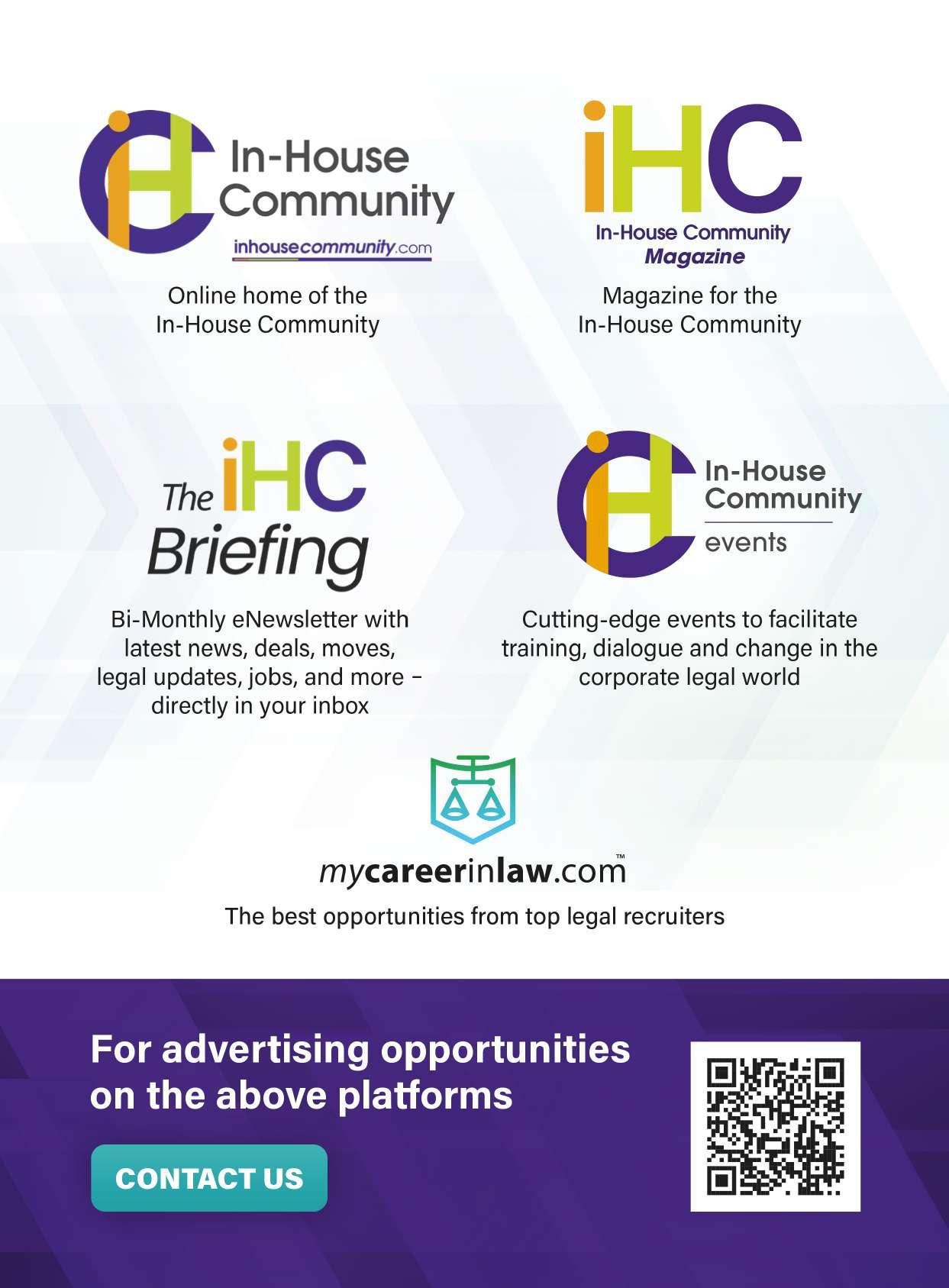
In-House Community
Magazine
PUBLISHER
Rahul Prakash +852 8170 2951
rahul.prakash@ inhousecommunity.com
LEAD DESIGNER
Richard Oliver
EDITOR
Sinal Govender
WRITER
Butch Bacaoco
CLIENT RELATIONSHIP MANAGER
Toni Angeline Dorotheo
Published 6 times annually by InHouse Community Ltd.
Publishers of
• In-House Community Magazine
• IHC Briefing
Organisers of the
• IHC Events
Hosts of
• www.inhousecommunity.com
• www.mycareerinlaw.com
Forums for the In-House Community
Opinions expressed herein do not constitute legal advice, and do not necessarily reflect the views of the publishers.
© 2024 InHouse Community Limited and contributors.




Kristin Charisse Siao, Partner, Villaraza & Angangco
Kristin Charisse Siao (“KC”) is a Partner at Villaraza & Angangco and the head of the firm’s M&A, Competition Law, and Energy practice areas. Having acted as general counsel for one of the Philippines’ largest renewable energy companies, KC has a keen understanding of the power and energy industry and a deep knowledge of the transactional, project development, commercial, operational, and regulatory aspects of energy matters.
Carlo Augustine A. Roman, Senior Associate, Villaraza & Angangco
Carlo Augustine A. Roman is a Senior Associate with more than seven years of experience in Corporate and Commercial Law. Specialising in the fields of government contracts, energy, logistics, and e-commerce, Carlo has extensive experience in mergers and acquisitions of entities in various industries. He is recognised by the Legal 500 as a Recommended Lawyer for Projects and Energy.
Rudi Bachtiar, Founding Partner, Head of ESG & Climate Change, ARMA Law
Rudi Bachtiar is an esteemed ESG and Climate Change lawyer, excelling in carbon, renewable energy, sustainability, and more. As the driving force behind ARMA Law’s ESG and Climate Change Practice Group, he brings the firm. to new heights. Rudi holds a master’s degree in Energy Law and Policy from the University of Dundee, UK, further solidifying his expertise.
Lam Nguyen Hoang Thao, Foreign Associate, Russin & Vecchi
EDITORIAL GUIDANCE PANEL




Carina Wessels
Executive: Governance, Legal and Compliance, Alexander Forbes Group Holdings
Preeti Balwani
General Counsel at Hindustan Coca-Cola Beverages
Ron Yu
University of Hong Kong, Chinese University of Hong Kong, Hong Kong University of Science and Technology
Stanley Lui
APAC Legal Director, TI Fluid Systems Co-Founder, White Hat Guys
Prior to pursuing a law degree, and for nearly 12 years, Thao worked in the Energy Sector with Schlumberger, one of the world’s largest upstream oil and gas service companies, as a petroleum engineer. Thao completed her Bachelor’s Degree in Law and Practical Legal Training in Australia.




Carl Watson General Counsel, Arcadis Asia
Raymond Goh General Counsel, International of China Tourism Group
Sally Dyson Director, Firm Sense
Yosr Hamza Director, Legal Counsel, Gartner



Navrita Kaur Chief Legal Officer, Omesti Group
Rebecca Hong Managing Counsel, Intel Corporation
Vecchi Managing Partner, Russin & Vecchi
Sesto




Teeing Up Success: Tianfu Liu on Strategic Leadership at Cabot Shanghai In-House Community Congress 2024: A Resounding Success
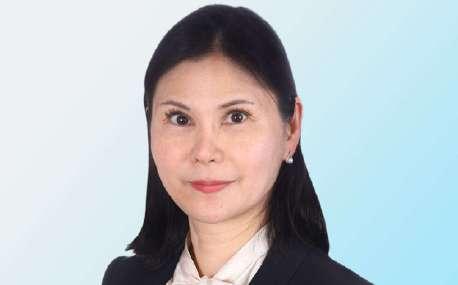
Atsumi & Sakai has established its Brussels office, which will enable the firm to support its clients’ European business development, in collaboration with its European offices in London and Frankfurt.
The Brussels office focuses on European Union competition law, while also providing advice on a wide range of other matters involving EU law. Miss Etsuko Kameoka, the representative partner of the Brussels office, has over 20 years of experience working at a law firm in Brussels that specialises in EU competition law.
Atsumi & Sakai includes among its team many non-Japanese lawyers, which enables the firm to provide advice on global projects that influence the Japanese market. In terms of Japanese law, the firm provides legal advice by Japanese attorneys, in collaboration with members of the firm’s Tokyo, London and other offices, allowing the firm to offer its clients a broad range of legal services from the perspectives of matters both outbound from Japan and inbound to Japan.
Bird & Bird has appointed 13 Partners, three Senior Counsel, 24 Counsel, one Legal Director and one Of Counsel in its annual global promotion round, all effective May 2024.

Promoted to partner are Stan Andreassen (Finance & Financial Regulation-Paris), Martin Conrads (Commercial-Hamburg), Rebecca Currey (IP-Sydney), Emma Drake (Privacy & Data Protection-London), Chris Ivey (Employment-Lyon), Saskia King (Competition & EU-London), Ville Kivistö (Dispute Resolution-Helsinki), George Mason (Corporate-London), Fiona McFarlane (Corporate-London), Katharina Pehle (IP-Munich), Surabhi Singhi (CorporateDubai), William Warne (IP-London) and Shehana Wijesena (IP-Sydney).

“Huge congratulations from myself and on behalf of the Board to all those promoted this year. These individuals will play a huge part in the future of our firm, as we embark on our new five-year strategy, embodying our exceptional and inclusive culture in their own
unique way. Each of them has a diverse set of strengths and expertise to support our clients and our firm. I’m looking forward to seeing them grow and succeed in their new roles,” said Graeme Maguire, Bird & Bird Chair.
Christian Bartsch, Bird & Bird CEO, added, “I’m proud to congratulate the exceptional individuals promoted across our international network. This year’s diverse and talented cohort of professionals will help accelerate our progress towards completion of the firm’s ambitious goals. We’re committed to working alongside each of them to continue delivering exceptional service to our clients. Here’s to a bright future ahead!”
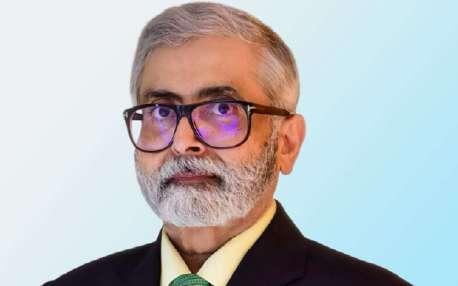
Shardul Amarchand Mangaldas has promoted 99 of its lawyers for FY 2024-25, with 53 lawyers being promoted to Senior Associate level and 46 lawyers being promoted to Principal Associate level.
The current round of promotions spans across the Firm’s offices and practice areas. These promotions mark a significant milestone in the firm’s continued growth and dedication to fostering talent and expertise within the legal profession.
“We are thrilled to announce the well-deserved promotions of these exceptional lawyers. Their unwavering dedication, legal expertise, and commitment to excellence exemplify the core values of our Firm. As they assume their new roles, I am confident that they will continue to uphold our tradition of providing top-tier legal services and drive the Firm’s success forward,” commented Executive Chairman Dr Shardul S Shroff.
Managing Partner Pallavi Shroff expressed profound pride in the accomplishments of these exceptional individuals, stating, “Our firm is built upon the pillars of expertise, dedication, and client-centric approach. The promotions of these outstanding lawyers embody our Firm’s commitment to recognising and nurturing talent, ensuring that we continue to deliver unparalleled legal solutions to our clients.”
Managing Partner Akshay Chudasama also said, “Each of these accomplished lawyers exemplify the highest standards of legal acumen, integrity and client service. Their promotions reflect not only their individual achievements but also the Firm’s unwavering commitment to excellence in legal practice. Their success is a testament of their hard work and the high-quality work they have helped the Firm deliver to clients.”


JSA Advocates and Solicitors has added Brijita Prakash as a partner. She has joined with a team of seven seasoned senior associates and associates. A specialist in property laws, Prakash has over 25 years of experience advising top clients in the real estate and renewable energy sectors, including
Dongkeun Lee, a former presiding judge at the Seoul High Court, brings more than 25 years of experience. Notably, as a judicial policy deliberation officer at the National Court Administration, he played a vital role in the revision of the Criminal Procedure Code and the introduction of the citizen participation system (also known as jury trial) in Korea. His experience also includes


Sungwook You, a former judicial researcher at the Supreme Court and a former presiding judge, has 18 years of experience on the bench. Notably, he served as a judicial researcher of the Supreme Court of Korea (tax and civil division) for four years from 2019 to 2023, and he is the only Korean judge who participated in the prestigious longterm research program at the Max Planck Institute for Tax Law and Public Finance in Germany. His multi-disciplinary practice extends beyond tax law, as amplified by his tenure at the Seoul Administrative Court and his co-authorship of the third edition of the Commentary on Criminal Law. In 2018, he was recognised as an Outstanding Judge by the Seoul District Bar Association, praised for his fair and impeccably reasoned judgment.

Herbert Smith Freehills’
Bangkok office has strengthened its Thai disputes practice with the appointment of Pariyapol Kamolsilp as a partner. Specialising in construction, energy, consumer and TMT disputes, Kamolsilp is highly skilled in advising domestic and international clients on a full spectrum of dispute resolution matters, including litigation, class actions, domestic and international arbitration, and mediation. He has represented numerous conglomerates, publicly listed and multinational companies in resolving complex local and cross-border disputes. Alongside his top-tier experience in dispute resolution, Kamolsilp broadens the practice scope with his capabilities and knowledge in business structuring, rehabilitation and bankruptcy. He also has deep experience in
advising clients on banking, capital markets and M&A matters. A graduate of Thammasat University and the Ohio State University, Kamolsilp is fluent in Thai and English, and is a member of the Lawyers Council of Thailand, as well as a registered arbitrator with both the Thai Arbitration Institute and Thailand Arbitration Center.


Baker McKenzie has added leading international arbitration practitioner Sunyoung Kim as a partner in Baker McKenzie & KL Partners Joint Venture Law Firm (Baker McKenzie KLP JV), effective May 20, 2024. Dual qualified in Korea and the US, Sunyoung is returning to Baker McKenzie after being an associate in the Firm’s Hong Kong office during 2009-2012. Her practice focuses on representing clients in international arbitration cases before the International Chamber of Commerce, the Singapore International Arbitration Centre, the China International Economic and Trade Arbitration Commission, and the Korean Commercial Arbitration Board, as well as in ad-hoc arbitrations. Sunyoung has represented multinational corporations, government entities, defence contractors and high-profile individuals in numerous commercial disputes, as well as disputes related to cross-border joint venture and M&A matters in the construction, shipping, energy and natural resources sectors. She also advises clients on investor-state matters. Sunyoung obtained her master’s degree in law in the US from the University of California, Berkeley, and her bachelor’s degree in law in Korea from Yonsei University.

Charles Russell
Speechlys has added Nicola Jackson as a partner in the firm’s Corporate Restructuring and Insolvency (CRI) team in Dubai. Jackson was previously co-lead of Clyde & Co’s Insolvency & Restructuring-Related Disputes and Contentious Advisory Practice in the Middle East. She has over 15 years on the ground experience in the Middle East, and is considered one of the most prominent and experienced CRI litigators in the region. She advises her client base of creditors, debtors and insolvency practitioners on a wide range of insolvency-related disputes in the UAE and beyond, on both pre-formal insolvency process strategies and strategies for dealing with disputes within formal insolvency processes. Jackson specialises in commercial and financial disputes before the Dubai International Finance Centre and Abu Dhabi Global Market Courts, and has acted on several high profile and/or seminal cases in this regard, including Credit Suisse v Goel, a seminal case which developed the line of jurisprudence relating to jurisdiction challenges in the DIFC Courts. In addition, she has experience acting for both local and international clients on commercial disputes before arbitration tribunals across multiple jurisdictions and under various institutional rules.

Charles Russell Speechlys has added Shirley Fu as a commercial and corporate partner in the firm’s Business Advisory & Transaction Services team in Hong Kong. Joining from SF Lawyers, Fu specialises in M&A and both
corporate and commercial matters, and has two decades of experience advising on complex corporate and commercial transactions in China and across Asia. She generally advises private and public listed companies and private equity clients on all types of transactions, including M&A, restructuring and joint ventures, as well as general corporate matters, from corporate governance, directors’ duties and shareholders’ rights to listing rules and compliance. Fu has worked with clients, including Chinese state-owned enterprises, multinational corporations, Japanese conglomerates, global and regional financial institutions and listed companies. She has a highly international practice, with legal qualifications and expertise in Hong Kong, Australia, England & Wales, New Zealand, Cayman Islands, BVI and the Greater Bay Area, China. She is also qualified as both a lawyer and accountant.

Shardul Amarchand Mangaldas & Co has added Rohit Tiwari as a partner in the capital markets practice. To be based out of the firm’s Mumbai office, he will be advising clients on various aspects of capital markets transactions. Tiwari has over a decade of experience and specialises in securities law, representing and advising clients across a wide range of sectors on public offerings of securities, including REITs, InvITs, IPOs, institutional placements and bond issuances. He has also been a regular contributor to internal and external publications on securities laws, private equity, corporate governance and investment trusts. Prior to joining the firm, Tiwari was a partner with Cyril Amarchand Mangaldas & Co for almost ten years, and with the capital

markets team at Trilegal for a year. He holds a Bachelor of Science and Bachelor of Legislative Law degree from Gujarat National Law University.


Charles Russell Speechlys has added a new international tax team to its Singapore Office, bolstering its existing international tax advisory capacity in Asia. The new team will be based in Singapore, and consists of partners Kurt Rademacher and Ivan Lu, legal director Timmoney Ng and senior associate Hara Kee, all of whom are fluent in Mandarin, Korean, Japanese, Cantonese and
English. Rademacher is a seasoned professional in international wealth transfer planning. He represents ultra-high net worth families and family-controlled businesses across the world on US federal income, gift and estate tax issues. Rademacher joined the firm on March 21, 2024. Lu is a US international tax lawyer who represents high net worth and ultra-high net worth individuals and families on estate planning. He has extensive experience representing US-connected families in the Greater China region and Southeast Asia. In addition to estate and tax planning, he frequently assists clients with IRS compliance and disclosure, and guides them through various IRS disclosure programmes. Lu joins the firm on April 1, 2024.



Allen & Gledhill has advised the Housing and Development Board (HDB) on the issue of S$800 million (US$593m) fixed rate green notes due 2027, under its S$32 billion (US$24m) multicurrency medium term note programme. The issue is an issuance of green bonds, proceeds of which are intended to be used to finance or refinance eligible green projects under the Project Category of Green Buildings, and for such other purposes, as set out in the HDB’s Green Finance Framework. Partners Margaret Chin and Sunit Chhabra led the firm’s team in the transaction.
AZB & Partners is advising Ester Industries on its more than US$150 million acquisition, along with Loop Industries, of 50 percent shares investing in a manufacturing facility in India to manufacture specialty
polymers using patented Loop technology. Both the parties will be contributing operational assets to this JV, such as ancillary marketing and agreements, technology licenses agreements, and human resources and infrastructural facilities. Partners Vinati Kastia and Ankit Tandon are leading the firm’s team in the transaction, which was signed on May 1, 2024 and is yet to be completed.
Baker McKenzie has advised Harvest Global Investments (HGI) on the authorisation and successful listing of Harvest Bitcoin Spot ETF and Harvest Ether Spot ETF in Hong Kong on April 30, 2024. The firm also assisted HGI in securing approval from the Securities and Futures Commission (SFC) to provide Type 9 virtual asset (VA) asset management services. This development not only makes



HGI among the first in Hong Kong to offer spot VA exchange traded funds (ETF) to retail investors, but also makes Hong Kong the first Asian city to allow retail spot virtual asset ETF tradings. The ground-breaking approvals came just a few months after the SFC released the circular on SFC-authorised funds with exposure to virtual assets on December 22, 2023. Financial services partners Karen Man and Sophia Man led the firm’s team in the transaction.
Carey Olsen has advised Beijing Energy International Holding, a leading global eco-development solutions provider, on the Bermuda law aspects of a US$40 million green bond issuance. On April 2, 2024, Beijing Energy International successfully issued the bond, featuring a term of two years and a historically low coupon rate of 2.70 percent. The issuance was oversubscribed by 3.04 times. Conducted under the green asset-backed special plan for supporting rural revitalisation of Beijing Energy International’s phase-I supply chain financing, the issuance provides a stable financial foundation for the continued development of the company. China Merchants Asset Management served as the manager, while China Merchants Securities acted as the underwriter. Hong Kong managing partner Michael Padarin led the firm’s team in the transaction.
Christopher & Lee Ong, member firm of Rajah & Tann Asia, has advised Maybank Investment Bank, as the underwriter, on the IPO of Keyfield International in Malaysia. Partner Justin Chua led the firm’s team in the transaction.
Clifford Chance has advised the joint sponsors CICC and CMBI on the IPO and listing of generative AI and voice interaction technology company Mobvoi in Hong Kong, making it the first AI-generated content (AIGC) company listed in Hong Kong. Mobvoi provides AIGC solutions, AI enterprise solutions and consumer smart devices and accessories with generative AI and voice interaction technologies. Partners Tianning Xiang and Fang Liu led the firm’s team in the transaction.

Cyril Amarchand Mangaldas has advised Warburg Pincus on the 100 percent acquisition of Shriram Housing Finance (SHF). Warburg Pincus has entered into a definitive agreement to acquire 100 percent of Shriram Housing Finance for Rs46.3 billion (US$556m). The selling shareholders include Shriram Finance, Valiant, private equity investor, and certain individual shareholders. This marks Warburg’s largest investment in India, targeting SHF, which is one of the country’s largest affordable housing finance companies. SHF is registered with the National Housing Bank and provides retail loans. Partners Shishir Vayttaden and Aditi Singhvi, supported by partners Subhojit Sadhu, Abe Abraham, Anirban Mohapatra, Avaantika Kakkar (competition law head), Dhruv Rajain, Bharath Reddy and Indranath Bishnu, led the firm’s team in the transaction, which was signed on May 13, 2024.
Davis Polk has advised ZEEKR Intelligent Technology Holding on its SEC-registered IPO of 21 million American Depositary Shares, each representing 10 ordinary shares, for total gross proceeds of US$441

million. The underwriters have an option to purchase up to an additional 3.15 million additional ADSs. New York-listed ZEEKR is a fast-growing battery electric vehicle (BEV) technology company. Through developing and offering next-generation premium BEVs and technology-driven solutions, ZEEKR aspires to lead the electrification, intelligentisation and innovation of the automobile industry. Since its inception, ZEEKR has focused on innovation in BEV architecture, hardware, software and application of new technologies. Partners Li He and Ran Li led the firm’s multi-jurisdictional team in the transaction. Simpson Thacher has represented the underwriters on the IPO and listing in New York. Goldman Sachs (Asia), Morgan Stanley Asia, Merrill Lynch (Asia Pacific) and China International Capital Corporation Hong Kong Securities acted as representatives of the underwriters. Hong Kong partners Yi Gao and Christopher Wong,

supported by partners Jonathan Cantor (New York-tax), George Wang (New York) and Bryan Jin (Palo Alto), led the firm’s team in the transaction, which is the largest US IPO by a Chinese company in the past three years.
Goodwin has advised Templewater and its portfolio company TW Pengu Holdings (TWPH) on their acquisitions of Singapore Breast Surgery Centre (SBSC), Central Luzon Integrated Oncology Centre (CLIOC) and Can-Care. TWPH aims to develop a premier oncology group in Asia to attract leading doctors and practices across multiple jurisdictions to enable patients to receive the best treatment and services across all stages of the treatment journey. With Templewater’s support, it has expanded its portfolio to include well-known oncology businesses that provide the highest standards of patient service. An alternative asset management firm headquartered in Hong Kong, Templewater
provides investment solutions to institutions, entrepreneurs and family offices across various asset classes. Its private equity strategy focuses on mid-market control buyout opportunities in the Asia Pacific. SBSC is an integrated breast cancer care group in Singapore; CLIOC is a leading oncology clinic located in San Fernando, Philippines, while Can-Care is a retailer and distributor of post-cancer care products in Singapore and Malaysia. Partner Edwin Chan, supported by partners Steve Howard, David Chen, Dulcie Daly, William Stern and Ai Tajima, led the firm’s team in the transaction.
JSA has advised Corra Technology and its founders on the India leg of Corra’s 100 percent acquisition by Publicis Group company Sapient, a multinational marketing communications holding corporation. Corra is a global commerce leader and systems integrator helping brands and organisations grow by evaluating, building and optimizing their digital commerce ecosystems. Founded in 2002 and headquartered in New York with additional operating locations established in the US, the UK and India, Corra helps build faster and flexible digital storefronts for growing brands across retail, food and beverage, technology and electronics, health and wellness, and B2B industries. The acquisition of Corra will enhance Publicis Sapient’s current capabilities in commerce solutions, including Adobe Commerce and MACH Alliance composable commerce solutions. Additionally, Corra would provide specialised resources that cover several of Publicis Sapient’s capabilities, such as strategy, product, experience, engineering, and data and AI. Partner Manvinder Singh,
supported by partner Anant Mishra, led the firm’s team in the transaction.
Khaitan & Co has advised Siemens on the demerger of its energy business, via scheme of arrangement, into a separate legal entity – Siemens Energy India (SEI), which is currently a wholly-owned subsidiary of
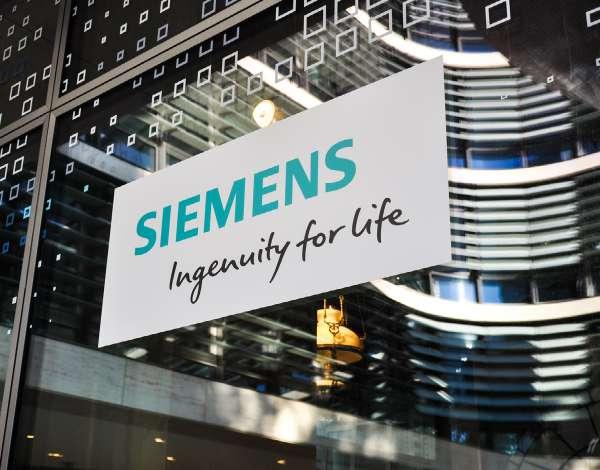
Siemens. As per the scheme of arrangement, Siemens shareholders will receive one SEI equity share for every one Siemens equity share. SEI will be subsequently listed, and will mirror the shareholding of Siemens, upon the receipt of requisite approvals. The proposed transaction is, inter alia, subject to receipt of requisite approvals from statutory and regulatory authorities, including the approval from BSE, NSE and the SEBI, the respective shareholders and creditors of Siemens and SEI, and the National Company Law Tribunal. The process of demerger, including receipt of requisite approvals, and subsequent listing of SEI is expected


to be completed in 2025. Partners Niren Patel, Mehul Shah and Shreya Mukherjee, supported by executive director Bhavin Vora and partners Arindam Ghosh, Anshul Prakash, Harsh Parikh, Anshuman Sakle and Anisha Chand, led the firm’s team in the transaction.

Moriah Law has advised private market exchange ADDX on establishing a MultiIssuer Debt Issuance Programme (MIDIP) for companies to issue digitised commercial paper and bonds on ADDX FI, ADDX’s dedicated segment for commercial paper and bonds. The inaugural offering under the MIDIP closed on April 2, 2024 for S$10 million (US$7.4m), six percent per annum, five-month unsecured commercial paper issued by LHN, a real estate services company incorporated in Singapore and listed in Singapore and Hong Kong. With orders totalling S$17.161
million (US$12.73m), LHN’s initial offering of S$5 million (US$3.7m) was oversubscribed by 343 percent. The resultant upsized S$10 million (US$7.4m) was the maximum amount authorised by its board. The transaction marked LHN’s successful entry into the debt capital markets. The innovative programme streamlines the issuance process, uniquely allowing different issuers to utilise umbrella terms to access alternative debt funding efficiently and reliably. Issuers may come to market in a matter of days, and issue fairly-priced commercial paper and bonds on ADDX FI, without incurring the time and costs usually associated with establishing an independent medium term note or debt issuance programme. With the MIDIP, issuers may expect savings of up to 90 percent or more in issuance costs. Mishcon de Reya also advised ADDX on English law.
Nishith Desai Associates has acted as lead counsel for EKA Software Solutions and its shareholders on the acquisition of EKA Software Solutions by Symphony Technology Group, a US-based private equity firm focused on software and software enabled services. With presence across Switzerland, Canada, the US, the UK, Australia, Singapore and India, EKA Software Solutions is a global provider of commodity management solutions. EKA Software Solutions has been engaged in the commodities trade and risk management and supply chain solutions, consistently delivering innovation to its customers. The sale was done via acquisition of the parent entity of the EKA group structure domiciled in Singapore. Partners Vaibhav Parikh (Bangalore office head and M&A / PE head) and Parul Jain (international tax head) led the firm’s team in the transaction.
O’Melveny has advised GS Energy, as co-lead investor, on the US$18.5 million Series B funding round of Ndustrial. An AI-powered energy intensity platform for industry, Ndustrial uses uniting production data with energy usage to help companies find energy-saving opportunities. The funding, for which initial close was announced on May 14, 2024, will be used to power growth and accelerate innovation to help industrial companies optimize the crucial metric of energy intensity. Ndustrial will also partner with GS Energy to offer its energy intensity solutions to industrial customers. GS Energy is the energy holding company of GS Group, a conglomerate based in South Korea with operations across the energy, power, retail and construction sectors. Seoul M&A partner Daniel Kim led the firm’s team in the transaction.
Rajah & Tann Singapore has acted for DigiAsia Bios, a Singapore-incorporated embeddable ‘Fintech-as-a-Service’ (FaaS) company with main business in Indonesia, on its US$500 million business combination with StoneBridge Acquisition, a wholly-owned subsidiary of special purpose acquisition company StoneBridge Acquisition. This strategic merger aims to leverage US capital markets for growth, primarily targeting consumer technology, communications, SaaS, fintech and media sectors within the Asia Pacific region. Partners Hoon Chi Tern and Debbie Woo led the firm’s team in the transaction.
R&T Asia (Thailand), member firm of Rajah & Tann Asia, has acted for United Overseas Bank (Thai), one of the largest banks in Southeast Asia, on its β5.7 billion (US$155m) financing transaction of Omega Logistic Campus’s smart automated warehouse project in Thailand. Partners Piroon Saengpakdee and Kamonnete Yongwattananunth led the firm’s team in the transaction.
Shardul Amarchand Mangaldas & Co has advised Apollo Hospitals Enterprise and Apollo Healthco (Apollo 24/7) on the multi-phase transaction involving an investment of Rs24.75 billion (US$296m) by Advent International into Apollo 24/7, acquisition of minority stake by Apollo 24/7 in Keimed for Rs7.25 billion (US$87m), and eventual amalgamation of Keimed with and into Apollo 24/7, with the combined entity being valued at an enterprise value of Rs224.8 billion (US$2.7b). The transaction is aimed at creating a leading integrated, omni-channel healthcare

eco-system, having an industry-defining business model with pan-India presence, and potential to unlock significant business synergies. Partners Puja Sondhi and Aayush Kapoor, supported by Ashni Roy, Manita Doshi, Harman Singh Sandhu and Rohan Arora, led the firm’s team in the transaction, which is subject to completion of customary conditions precedent, including approval of the Competition Commission of India and Apollo Hospitals Enterprise public shareholders. Cyril Amarchand Mangaldas & Co (Mumbai) advised Advent International. AZB & Partners (Chennai) also advised Apollo Healthcare Enterprises and its Board of Directors.
Simpson Thacher is advising KKR on the signing of definitive agreements, under which funds managed by KKR will acquire Healthium
Medtech, a leading Indian medical devices company, from an affiliate of Funds advised by Apax Partners. Hong Kong M&A partner Ian Ho led the firm’s team in the transaction.
Skadden is advising Cemex Asia on its sale of its operations and assets in the Philippines, including Cemex Holdings Philippines (Cemex Philippines), to Dacon Corporation, DMCI Holdings and Seminara Mining and Power Corporation. Philippine-listed Cemex Philippines is one of the leading cement producers in the Philippines, based on annual installed capacity. Cemex has signed an agreement to sell 100 percent of Cemex Asian South East Corporation, which owns approximately 89 percent of Cemex Philippines, based on an enterprise value for Cemex Philippines of approximately US$660 million, along with Cemex’s related 40 percent indirect equity



interest in each of APO Land & Quarry and Island Quarry and Aggregates, based on an aggregate enterprise value of approximately US$140 million for APO and Island. Cemex expects to close the sale before year end 2024, subject to the satisfaction of closing conditions, including approval by the Philippine Competition Commission and the buyers’ fulfillment of any mandatory tender offer requirements to the shareholders of Cemex Philippines. Partners Jonathan Stone (Hong Kong) and Rajeev Duggal (Singapore), supported by Hong Kong antitrust/competition partner Andrew Foster and New York tax partners Gregory Fernicola, Nazmiye Gökçebay and Alec Jarvis, led the firm’s team in the transaction.
TT&A has advised International Finance Corporation (IFC) on its proposed investment

in Sunshine Healthcare Lanka (SHL), the healthcare arm of the diversified conglomerate Sunshine Holdings in Sri Lanka, for SLR3.27 billion (US$11m). The deal pertains to the proposed acquisition of 14.73 percent shareholding by IFC. The IFC investment fortifies Sunshine’s commitment to meet the growing healthcare needs of Sri Lanka, and will bolster SHL’s implementation of significant capital projects to expand and enhance healthcare delivery nationwide. Joint managing partner Gautam Saha and partnerPunita Gupta, supported by partner Amrita Patnaik, led the firm’s team in the transaction.
WongPartnership is acting for DBS on the sale of the units and leaseback of units where it is continuing its operations as a branch or ATM. Partner Jerry Tan is leading the firm’s team in the transaction.
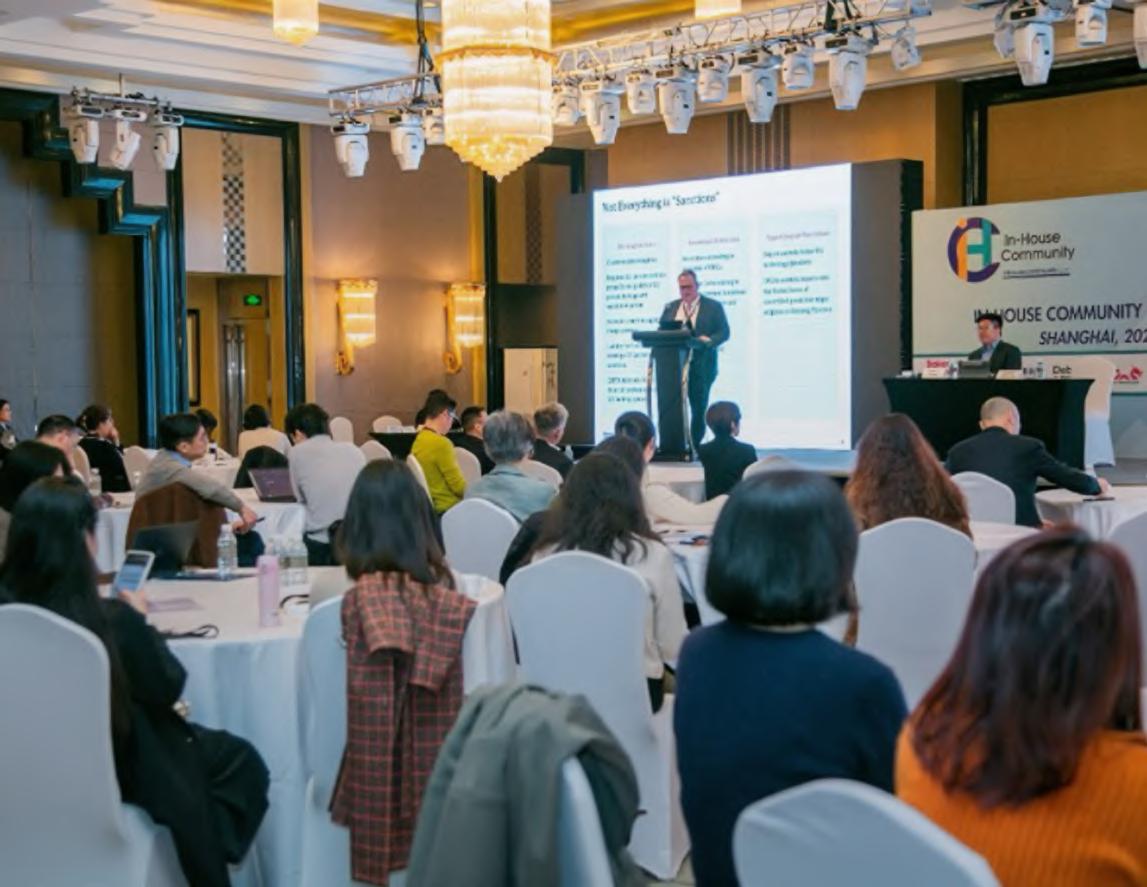
The Shanghai In-House Community Congress 2024, held on 27 March at the Renaissance Shanghai Pudong Hotel, was a standout event that brought together over 100 in-house counsel, General Counsels, and Compliance Professionals. Organised by the In-House Community, the congress offered a dynamic platform for knowledge exchange and networking. This was the first in-person event for the In-House Community brand since 2019.
Opening and GC Panel Discussion on ‘Strategic Integration & Collaboration for In-House Legal Teams’
The day kicked off with opening remarks by Rahul Prakash of the In-House Community,
setting an enthusiastic tone for the congress. This was followed by a compelling GC Panel Discussion on “Strategic Integration & Collaboration for In-House Legal Teams,” featuring esteemed panellists such as Eileen Ng from Harley-Davidson, Jing Bu of Quanxium Spatial Intelligence, and Tianfu Liu from Cabot Corporation.
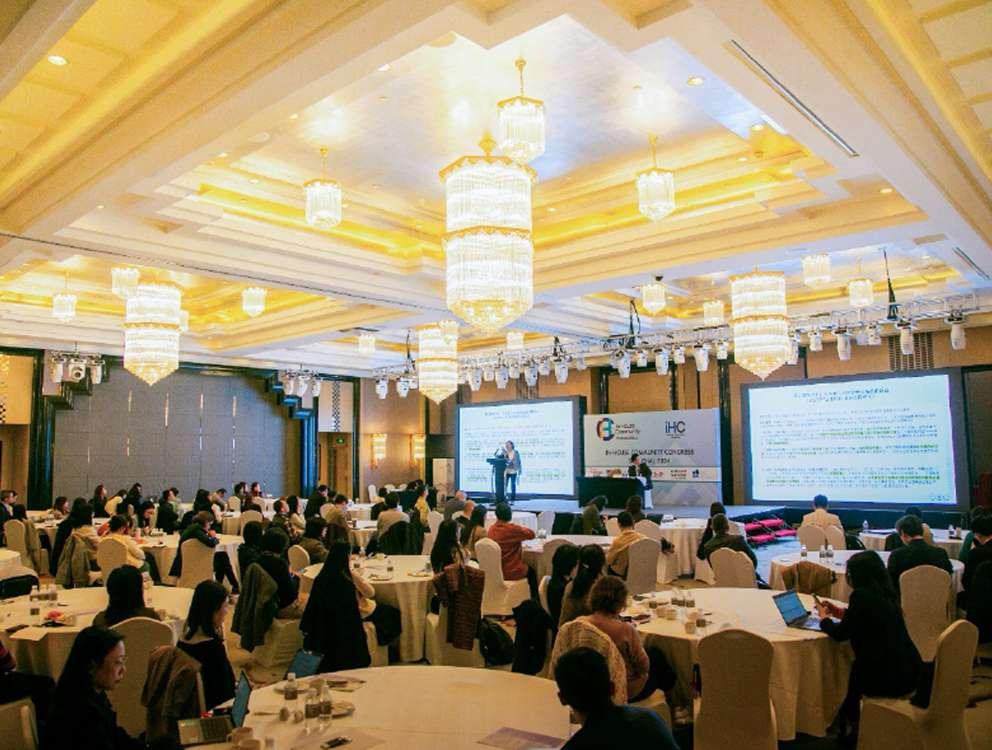
• Impact of China’s Civil and Commercial Legislation: Honghuan Liu and Zhou Xi from Baker McKenzie FenXun delved into the major legislative changes in China, providing crucial insights for legal professionals.
• Investment Opportunities: Mayuree Sapsutthiporn from Kudun & Partners explored investment strategies in Thailand, highlighting emerging opportunities for legal advisors.
• Regulatory Expectations: Philip Rohlik and Samuel Fung of Debevoise & Plimpton discussed critical issues related to corruption, sanctions, and corporate governance, emphasising the importance of regulatory compliance.
• Corporate Governance and Compliance: Fengwen Jiang from Chance Bridge Law Firm examined significant changes in the PRC Company Law, offering practical guidance on corporate governance and compliance. She was joined by her colleague Robert Lewis who further gave the audience a brief update on how the new company law impacts the FIE conversion requirements.
The congress featured multiple networking opportunities, including refreshment breaks and a lunch session, facilitating meaningful interactions among participants. The event concluded with closing remarks and a prize draw given away by Russell Worth of PSA Group.
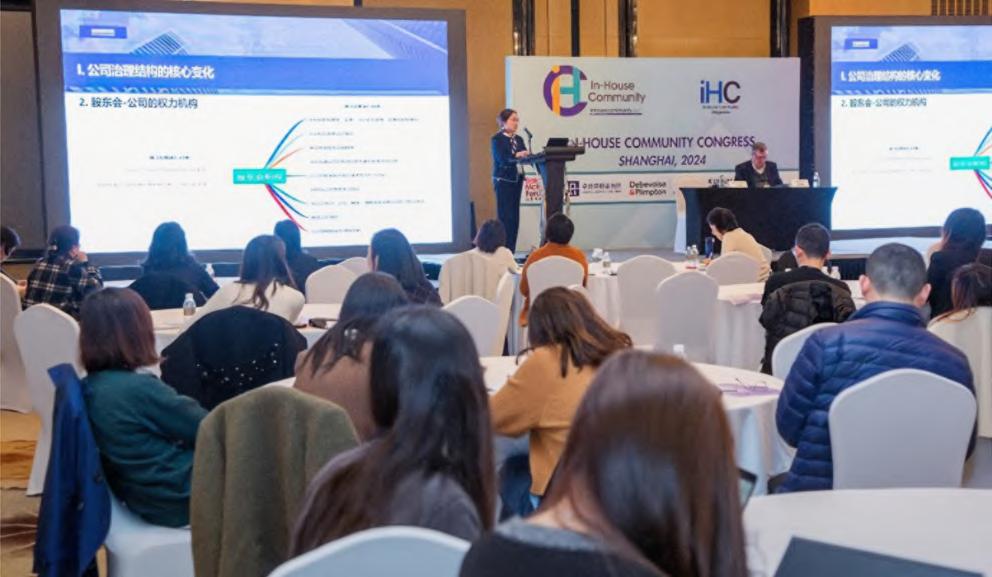
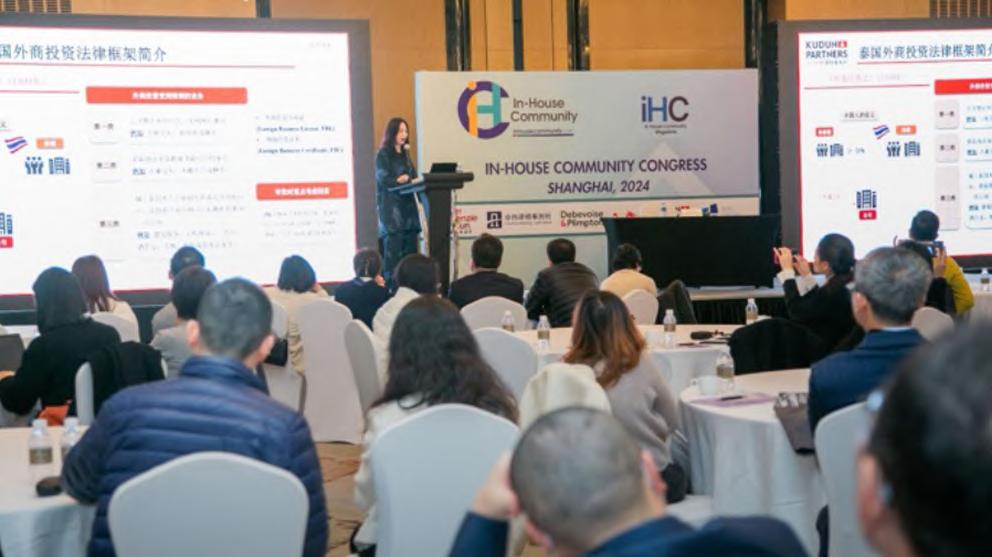
Following the success of the 2024 congress, the In-House Community is excited to announce that the 2025 event is already in the works, proudly sponsored by Joint-Win Partners with more to join. With the momentum gained from this year, the 2025
congress promises to be even more impactful, bringing together a vibrant community of legal professionals eager to share insights and forge new connections. If you would like to attend or sponsor the 2024 Shanghai IHC Congress, please email us at events@ inhousecommunity.com.
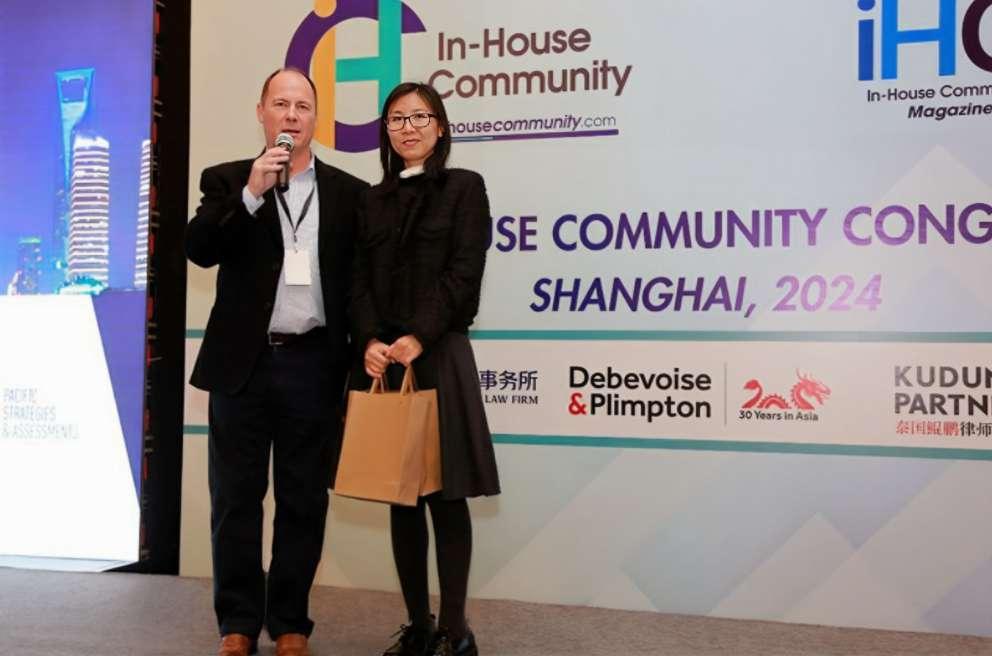
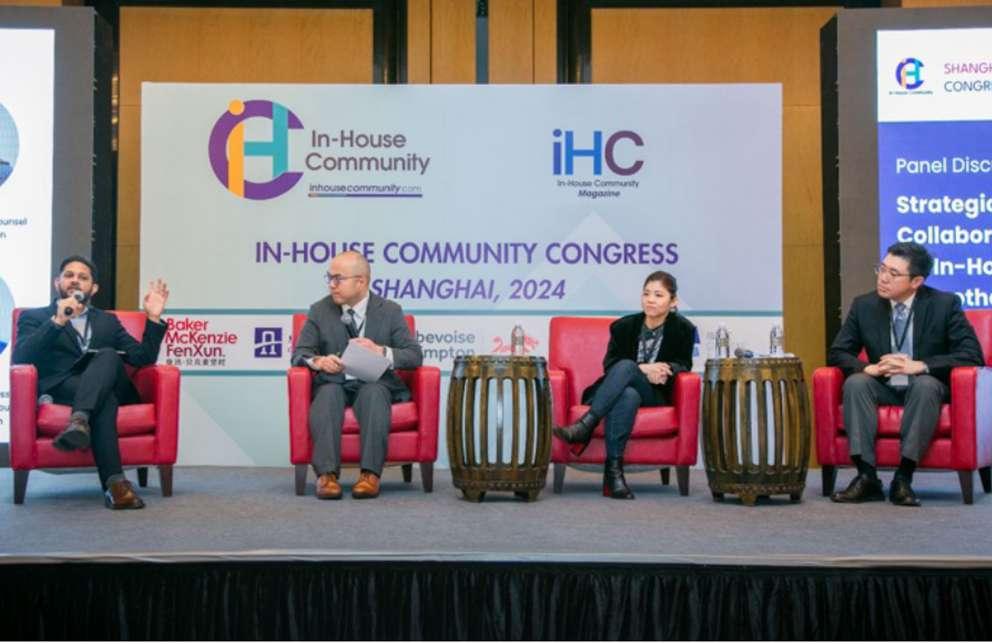

The global push toward Environmental, Social, and Governance (“ESG”) practices in businesses of all sizes has seen rapid growth in recent years, with the Philippines being no exception to this growing movement. More and more, industry leaders and model organisations across the local business landscape have placed increasing emphasis on non-financial metrics that address critical social and environmental issues, with an eye toward making sure that business practices and investments will continue to be sustainable not merely on the basis of the balance sheet, but also society as a whole. Truly,
investors in both the Philippines and abroad have become keener toward focusing on not just mere economic growth, but inclusive, balanced, and sustainable growth that can be maintained in the longer term.
With this in mind, legislators and regulators in the Philippines have slowly but surely adjusted to the growing call for ESG monitoring and enforcement. As such, it is slowly becoming impossible for businesses to ignore social and ethical considerations when running their day-to-day affairs in this jurisdiction.
Consistent with global ESG trends and the push toward greater transparency for non-financial and sustainability issues –particularly in the present economic climate which prioritises environmental and social impact of businesses more than ever – the Securities and Exchange Commission (“SEC”) published Memorandum Circular No. 4, Series of 2019, or the “Sustainability Guidelines for Publicly Listed Companies (“PLCs”)” (the “SEC Sustainability Guidelines”), in order to help PLCs assess and manage non-financial performance across economic, environmental, and social aspects of their organisation. The reporting guidelines aimed to monitor businesses’ contributions toward achieving universal targets of sustainability, including the United Nations Sustainable Development Goals, as well as national policies and programs pushing ESG and general corporate responsibility (i.e., including the AmBisyon Natin 2040 plan propagated by the National Economic and Development Authority (“NEDA”), which advocates a prosperous, predominantly middle-class Filipino society where no one is poor over the next twenty-five years.
In this regard, the SEC published a reporting template in the SEC Sustainability Guidelines for submission, together with the PLC’s Annual Report, which shall be subject to a “comply or explain” approach for the first three years of implementation, meaning that companies shall be required to attach the reporting template to their Annual Reports, but can provide explanations for items for which they still have no available data on. The reporting template requires disclosure of, among others, the reporting PLC’s:
It is slowly becoming impossible for businesses to ignore social and ethical considerations when running their dayto-day affairs in this jurisdiction
a. Economic performance, including direct economic value generated (revenue) and direct economic value distributed (e.g., operating costs, employee wages and benefits, and taxes paid);
b. Climate-related risks and opportunities;
c. Procurement practices and proportion of spending on local suppliers;
d. Anti-corruption policies and procedures;
e. Environmental resource management;
f. Water consumption within the organisation;
g. Ecosystems and biodiversity;
h. Air emissions and pollutants;
i. Solid waste and hazardous waste;
j. Effluents;
k. General environmental compliance;
l. Employee management, including employee hiring and benefits;
m. Labor-management relations;
n. Diversity and equal opportunity;
o. Workplace conditions, labour standards, and human rights;
p. Supply chain management;
q. Relationship with community; and
r. Data security.
Non-attachment of the Sustainability Report to the Annual Report shall be subject to the penalty applicable to an incomplete Annual Report, specifically a fine pursuant to SEC Memorandum Circular No. 6, Series of 2005.
Republic Act No. 11898, or the “Extended Producer Responsibility Act” passed into law on 23 July 2022 and introduced the extended producer responsibility (“EPR”) mechanism, specifically with the goal of making product producers environmentally responsible for the entire life cycle of their products. The law imposes this responsibility by making covered product producers accountable for the proper management of their plastic packaging waste, including: sachets, labels, laminates, other flexible plastic packaging products, rigid plastic packaging products, plastic bags, and polystyrene.
The law specifically applies to “large enterprises”, which refer to business entities whose total assets exceeds One Hundred Million Pesos (PhP100,000,000.00), and Micro, Small and Medium Enterprises (“MSMEs”) only when the total value of all assets of all enterprises carrying the same brand, label, or trademark exceeds One Hundred Million Pesos (PhP100,000,000.00). MSMEs not falling within the specified threshold are not required to comply but are encouraged to voluntarily adopt the EPR mechanism.
Covered entities are required to establish EPR programs for their plastic packaging within six months from the effectivity of the law, register the programs with the National Solid Waste Commission, measure their annual plastic packaging footprint, meet diversion targets, and submit annual compliance reports called the EPR Compliance Report (“ECR”) to the DENR.
Companies with EPR programmes are required to offset their respective plastic packaging footprint in line with the following targets which have been imposed by law:
In case a company fails to meet the above-mentioned targets, it is liable to pay the fines highlighted below, or the cost of recovery and diversion of the company’s footprint or shortfall, whichever is higher.
First Offense Not less than PhP5,000,000.00 but not more than PhP10,000,000.00
Second Offense Not less than PhP10,000,000.00 but not more than PhP15,000,000.00
Third Offense Not less than PhP15,000,000.00 but not more than PhP20,000,000.00, as well as automatic suspension of the business permit until the requirement of the law is complied with
To ensure compliance with the diversion targets, covered entities should implement an auditing system which should follow the guidelines provided under DENR Department Order No. 2024-04, as discussed below.
Large enterprises are allowed to tap into a Producer Responsibility Organisation (“PRO”) for the implementation of EPR programs. Likewise, multiple companies may pool their resources and form a PRO. The EPR programs should be aimed at reducing environmentally unfriendly products or the recovery of product waste and may include the following activities or strategies enumerated under the law:
a. Adoption of reusable products or product redesign to improve its reusability, recyclability, or retrievability;
b. Inclusion of recycled materials in a product;
c. Adoption of appropriate product refilling systems for retailers;
d. Viable reduction rates plan;
e. Information and education campaign schemes;
f. Appropriate product labeling including information for the proper disposal of the waste product;
g. Waste recovery schemes such as redemption, buy-back, offsetting;
h. Diversion of recovered waste into value chains through recycling and other sustainable methods;
i. Transportation of recovered waste to appropriate recycling, composting, or other diversion or disposal sites;
j. Waste clean-ups in coastal areas, public roads, or other sites;
k. Establishment of commercial or industrial scale recycling, composting, thermal treatment and other waste diversion or disposal facilities;
l. Partnership with LGUs, communities, and the informal waste sectors.
To strengthen its implementation, the law gives incentives for compliance or voluntary participation and imposes steep fines for failure of covered entities to register their respective EPR programs or meet the diversion targets. The incentives include tax incentives for eligible activities, deductions from gross annual income, and exemptions from taxes and custom duties for donations, legacies or gifts for the maintenance and support of EPR programs.
In order to support the enforcement of the Extended Producer Responsibility Act, the DENR issued Administrative
Order No. 2024-04 dated 22 April 2024 (the “Order”), which provides guidelines for compliance reporting and auditing in relation to the EPR mechanism. Under the Order, the ECR must include the following information:
a. Summary of accountable plastic footprint measured in terms of weight in kilograms and material type such as flexible plastic, rigid plastic;
b. Summary of accounted plastic waste recovered for reuse, recycle, diversion or proper disposal;
c. Plastic waste diversion accomplishment report which should be presented in percentage per plastic material type and computed using the formula:
Actual Accomplishment = Accounted plastic waste diverted x 100
Accountable plastic footprint
d. Sworn statements by the duly designated officer responsible for the EPR Program and the President, CEO, or equivalent officer of the reporting entity attesting to the truthfulness and accuracy of the data presented.
The ECR must be audited by an independent third-party auditor who should be a Certified Public Accountant and must not be an officer or employee of the reporting entity or any of its affiliates. The auditor must submit an EPR Compliance Audit Report (“ECAR”) to the Environmental Management Bureau. The ECAR consists of the independent third-party audit report – which may be an Agreed-Upon Procedures Report, Limited Assurance Report, or Reasonable Assurance Report – and the duly notarised ECR. Samples of the reports are provided by the DENR in the Order itself, and may be used by covered entities as basis for their own submissions.
The deadline for filing of the ECAR is on June 30 or the first working day immediately after June 30. The accountable plastic footprint is based on the products or services released to the market the year preceding the compliance year, except for the year 2023 wherein the reporting entities may base the amount of accountable plastic footprints from either the year 2022 or 2023. Trade secrets, breakdown of production or sales figures, and contracts or processes unique to the reporting entity or would adversely affect its competitive position are considered confidential business information and need not be submitted with the ECAR.
Other than the rules on EPR, there are currently no national laws regulating the use of single-use plastics and packaging in the Philippines. However, a bill is being considered which, if ratified, would require businesses to phase out the use and import of single-use plastics within one (1) year from the law coming into effect.
In 2022, Senator Loren Legarda filed Senate Bill No. 246 entitled the “Single-Use Plastics Regulation and Management Act” which intends to regulate the manufacturing, importation, and use of single-use products by providing penalties, levies, and incentives for industries and consumers. The bill would reinforce the use of reusable materials while mandating that all single-use plastics already in circulation will be collected, recycled, and properly disposed of in accordance with the existing Ecological Solid Waste Management Act. Violators of the provisions of the bill, if enacted into law, will be subject to fines ranging from Five Thousand Pesos (PhP5,000.00) to Five Hundred Thousand Pesos (PhP500,000.00), as well as permanent
suspension of the business permit and administrative penalties for erring government officials. To date, the bill continues to be pending before the Senate Committee on Environment, Natural Resources and Climate Change.
Additionally, local governments may pass ordinances which regulate the use of single-use plastics and packaging in the Philippines. Enforcement of these ordinances shall be the obligation of the relevant local government units, and applicability thereof will depend on the specific location of the business concerned.


Kristin Charisse Siao, Partner, Villaraza & Angangco
Kristin Charisse Siao (“KC”) is a Partner at Villaraza & Angangco and the head of the firm’s M&A, Competition Law, and Energy practice areas. Having acted as general counsel for one of the Philippines’ largest renewable energy companies, KC has a keen understanding of the power and energy industry and a deep knowledge of the transactional, project development, commercial, operational, and regulatory aspects of energy matters.

Carlo Augustine A. Roman, Senior Associate, Villaraza & Angangco
Carlo Augustine A. Roman is a Senior Associate with more than seven years of experience in Corporate and Commercial Law. Specializing in the fields of government contracts, energy, logistics, and e-commerce, Carlo has extensive experience in mergers and acquisitions of entities in various industries. He is recognized by the Legal 500 as a Recommended Lawyer for Projects and Energy.

Over the past decade, Indonesia has demonstrated a consistent dedication to advancing its ESG commitments, including working towards the 17 United Nations Sustainable Development Goals (SDGs) by 2030. In 2018, Bappenas or Indonesian National Planning Agency released the SDGs Roadmaps outlining out the nation’s strategies for achieving these goals.
At the implementation level, we have observed the Indonesian government issuing various regulations and policies addressing ESG, including mandatory disclosure requirements in the financial sector and listed companies and various voluntary commitments.
Publicly listed companies and financial institutions are required to disclose their ESG practices as mandated by the Financial Services Authority (Otoritas Jasa Keuangan or OJK) under OJK Regulation No. 51/POJK.03/2017 regarding the Implementation of Sustainable Finance for Financial Service Institutions, Issuers (Emiten), and Public Companies (OJK Reg 51/2017). Non-listed companies do not have the same mandatory disclosure obligations. However, under the Indonesian Company Law, the Board of Directors (BOD) of a non-listed company must submit an annual report, which includes a report on the implementation of Corporate Social and
Environmental Responsibility (CSER), to the General Meeting of Shareholders. This report requires approval by the Board of Commissioners (BOC) and must be submitted no later than six months after the end of the company’s fiscal year.
In February 2024, the Indonesian government introduced the Taxonomy for Indonesian Sustainable Finance (TKBI), a revised version of the Indonesian Green Taxonomy Edition 1.0. TKBI classifies economic activities that support Sustainable Development Goals (SDGs), covering economic, environmental, and social aspects. It serves as a guide to improve capital allocation and sustainable financing to help Indonesia achieve its Net Zero Emission (NZE) targets by 2060 or earlier. Developed with reference to the ASEAN Taxonomy for Sustainable Finance and Indonesian national policies, TKBI focuses on climate change mitigation, climate change adaptation, protection of healthy ecosystems and biodiversity, and resource resilience with a transition to a circular economy.
TKBI uses two assessment approaches: technical screening criteria for the corporate/non-MSME segment and a sector-agnostic decision tree for the MSME segment. Activities are classified as “Green,” “Transition,” or “Does not meet classification.” The taxonomy concentrates on five key sectors: Energy, Waste, Industry Processes and Product Use (IPPU), Agriculture and Forestry, and Other Land Use (FOLU). The TKBI will be reviewed periodically to keep pace with advancements in science, technology, and sustainable finance policies both nationally and globally.
On September 26, 2023, the Indonesian government enacted Presidential Regulation Number 60 of 2023, outlining the National Strategy for Business and Human Rights. This regulation guides ministries, institutions, and regional governments in planning, implementing, and monitoring practices related to business and human rights. Additionally, it provides directives for businesses and stakeholders to uphold human rights within the business sector. The regulation aims to promote a competitive business environment in Indonesia that is firmly rooted in human rights respect.
Indonesia has made significant progress in decarbonization and developing its carbon market. Presidential Regulation No. 98 of 2021 on the Carbon Economic Value allows private entities to participate in emission reduction through carbon offset trading. Presidential Regulation No. 112 of 2022 on the Acceleration of Renewable Energy Development for Electricity Generation mandates the phasing-out of coal-fired power plants and prohibits the development of new ones. Additionally, Presidential Regulation No. 14 of 2024 supports the growth of carbon sequestration projects, focusing on capturing and storing carbon emissions (CCU and CCS). These regulations are vital aspects of Indonesia’s decarbonization efforts. Moreover, the Indonesia Stock Exchange launched the carbon exchange (IDX Carbon) to facilitate the trading of carbon offsets (Emission Reduction Certificates or SPE GRK) and Business-as-Usual Emission Upper Limits (PTBAE-PU). This initiative enables entities to actively participate in
emission reduction endeavors, thereby contributing to Indonesia’s decarbonization objectives.
The impact of Indonesia’s regulatory framework for ESG and related initiatives on businesses operating in the country is multifaceted. While compliance may entail increased costs for data collection, reporting, and infrastructure upgrades, companies that align with ESG principles stand to gain competitive advantages, including enhanced brand reputation, access to capital, and risk mitigation. Embracing sustainability can drive innovation and unlock new business opportunities, positioning firms for long-term success in a socially conscious marketplace. Overall, while compliance may pose challenges, the regulatory framework presents opportunities for strategic differentiation, resilience, and sustainable growth.
Indonesia’s evolving ESG regulatory framework, while a positive step, presents challenges for businesses seeking compliance. The rapid pace of change in regulations and best practices makes interpretation and implementation difficult, especially for companies striving to align with global standards. Small and medium-sized enterprises (SMEs) are particularly burdened by resource constraints. Limited finances, lack of internal expertise, and restricted access to external support make it hard for them to
invest in sustainable practices and comply with regulations.
Furthermore, the current framework lacks strong incentives for ESG compliance. Without clear rewards, like tax breaks or subsidies for sustainable practices, companies may Prioritise short-term gains over long-term sustainability goals. Additionally, inconsistencies in regulations across sectors and regions create confusion for nationwide businesses. This lack of harmonization makes it difficult to establish a consistent ESG strategy, potentially leading to compliance gaps and legal risks. Addressing these challenges requires a collaborative effort from the government and businesses to create a more supportive environment for ESG compliance.
As lawyers, we provide essential support to clients facing ESG compliance challenges in Indonesia by conducting thorough legal analyses to ensure adherence to regulations and identifying areas for improvement. We assist in risk assessment and mitigation, helping clients navigate potential legal and regulatory pitfalls associated with ESG compliance. Additionally, we guide stakeholder engagement and effective communication strategies to foster transparency, build trust, and avoid greenwashing. We keep clients informed about the latest regulatory updates and trends in ESG reporting, ensuring they remain compliant with current and upcoming requirements. Our experts help interpret and apply complex ESG regulations, providing clarity on mandatory disclosures and voluntary best practices. Through training and capacity-building initiatives, we empower clients to cultivate a culture of sustainability within their organizations. Furthermore, we advocate for clients’ interests in regulatory
discussions, aiming to influence policy development and seek clarity in regulatory frameworks.
As mentioned above, only publicly listed companies and financial institutions are required to disclose their ESG practices under OJK Reg 51/2017. They must implement sustainable finance by:
a. Submitting an annual Sustainability Report (Laporan Keberlanjutan) to the OJK and publishing it on their websites.
b. For financial institutions, submitting an annual Financial Sustainability Action Plan (Rencana Aksi Keuangan Berkelanjutan) to the OJK, including one-year and five-year sustainability work plans.
OJK Circular Letter No 16/SEOJK.04/2021
further specifies the required content for the Sustainability Report:
a. Sustainability strategy explanation.
b. Overview of economic, social, and environmental sustainability aspects.
c. Brief company profile.
d. Board of directors’ statement.
e. Sustainability governance.
f. Sustainability performance.
g. Independent verification (if any).
h. Feedback sheet for readers (if any).
i. Response to feedback from the previous year’s report.
These requirements promote transparency and accountability in the sustainability practices of publicly listed companies and financial institutions in Indonesia.
Investor expectations regarding ESG performance significantly influence companies in Indonesia. These expectations drive companies to prioritize sustainability and improve governance practices to access capital, as investors increasingly consider ESG factors when making investment decisions. For instance, in the palm oil industry, investors often look for companies certified by the Roundtable on Sustainable Palm Oil (RSPO), which sets standards for sustainable palm oil production. Companies that adhere to RSPO principles demonstrate their commitment to environmental conservation, fair labour treatment, social responsibility, and ethical business practices, thus attracting investment from ESG-conscious investors. Shareholder activism is also on the rise, prompting companies to respond to demands for enhanced ESG standard performance in the context of joint venture or acquisition. Moreover, companies recognize that poor ESG performance can lead to heightened risks related to regulatory compliance, reputational damage, and supply chain disruptions, motivating them to integrate ESG considerations into their risk management strategies and avoid practices such as greenwashing and bluewashing.
Companies aiming to meet investor expectations for ESG performance should consider conducting assessments of their current practices and developing tailored ESG strategies that align with local regulations and cultural norms. This includes engaging with local stakeholders to understand their priorities and incorporating this feedback into the company’s ESG strategy. Enhancing transparency
through regular and comprehensive reporting is essential, providing clear metrics to track progress towards ESG goals. Integrating ESG considerations into all levels of decision-making, from strategic planning to daily operations and supply chain management, is crucial. Additionally, investing in updated training and education programs for employees to increase awareness of ESG issues and build capacity for implementing effective ESG initiatives will further support these efforts.
What proactive steps can companies take to enhance their ESG performance and meet investor expectations in Indonesia?
Companies should regularly review and update their ESG strategies to address evolving issues and stakeholder expectations
Adopting global and local best practices and standards for ESG management, and collaborating with industry peers, trade associations, and government agencies to share knowledge and drive collective action on ESG-related challenges and opportunities, is also important. Companies should regularly review and update their ESG strategies to address evolving issues and stakeholder expectations. Implementing effective grievance mechanisms for addressing stakeholder concerns and seeking independent verification from third-party auditors can enhance credibility and ensure compliance with evolving standards. Furthermore, aligning ESG efforts with the specific requirements of their investors, which may vary based on different investor standards, will be beneficial. Within the context of Indonesia’s regulatory framework, these steps will help companies stay proactive and responsive to regulatory requirements, fostering sustainable growth and resilience in an increasingly ESG-conscious investment landscape.
To enhance ESG performance while balancing commercial aspects and meeting investor expectations in Indonesia, companies should develop a clear strategy with measurable goals, conduct comprehensive assessments, and benchmark against industry standards. For example, a manufacturing company might set targets to reduce Scope 1 and Scope 2 carbon emissions by a certain percentage over five years. Strengthen governance, integrate ESG into risk management, and address environmental, social, legal, and commercial risks. Implement sustainable practices, such as sourcing materials responsibly, ensure regulatory compliance, and regularly engage stakeholders, incorporating their feedback. Transparently report ESG performance using recognized frameworks, educate employees on ESG importance, and leverage technology for monitoring and innovation. Prioritize pre-assessments and due diligence to address legal risks and adhere to relevant regulations, ensuring commercial viability alongside sustainability.
Are there specific frameworks or guidelines that companies can adopt to improve their ESG practices?
Indonesian companies can enhance their ESG practices by adopting various established frameworks and guidelines. Key frameworks include the Global Reporting Initiative (GRI) for sustainability reporting, the Sustainability Accounting Standards Board (SASB) for industry-specific ESG reporting, and the Task Force on Climaterelated Financial Disclosures (TCFD) for climate
risk disclosure. Companies can also follow the United Nations Global Compact (UNGC) principles for responsible business practices and the Principles for Responsible Investment (PRI) for integrating ESG into investment decisions. Standards like ISO 14001 and ISO 45001 help improve environmental management and occupational health and safety, while the Carbon Disclosure Project (CDP) supports environmental impact reporting. The ASEAN Corporate Governance Scorecard (ACGS) provides a framework for corporate governance in ASEAN countries, including Indonesia.
For sector-specific guidance, the Roundtable on Sustainable Palm Oil (RSPO) and Indonesian Sustainable Palm Oil (ISPO) offer standards for sustainable palm oil production. The Kadin Net Zero Program supports companies in achieving net-zero emissions, aligning with national and international climate goals. Additionally, the Indonesian Investment Coordinating Board (BKPM) has issued sustainable investment guidelines to promote ESG considerations in investment decisions. By adopting these frameworks and guidelines, companies can improve their ESG performance, meet investor expectations, and contribute to sustainable development.
ARMA Law works closely with clients to incorporate ESG policies by providing customized advice and support. We assist clients in identifying ESG risks and opportunities, assessing the scale of these risks, including legal risks, crafting effective strategies, and enhancing their long-term sustainability and value. Our services encompass assessments,
strategy development, and reviews of contracts and transactions to ensure comprehensive ESG consideration.
We consistently stress the importance of pre-assessments and due diligence to our clients before they initiate new ventures. This approach ensures they account for the relevant regulatory frameworks and standards applicable to their business.


Rudi Bachtiar, Founding Partner, Head of ESG & Climate Change
Rudi Bachtiar is an esteemed ESG and Climate Change lawyer, excelling in carbon, renewable energy, sustainability, and more. As the driving force behind ARMA Law’s ESG and Climate Change Practice Group, he brings the firm to new heights. Rudi holds a master’s degree in Energy Law and Policy from the University of Dundee, UK, further solidifying his expertise.
 PEDRO MASSENA WITH RAHUL PRAKASH
PEDRO MASSENA WITH RAHUL PRAKASH
Twenty years ago, if a CEO was asked to merge sustainability with their corporate strategy they would have assumed someone was trying to sabotage the business. Changing the focus away from profits was unthinkable. But in-house legal teams have proven critical for finding ways to make sure sustainability doesn’t need to bite into the bottom line.
In the bustling and diverse Asia-Pacific region, Environmental, Social, and Governance (ESG) principles have rapidly reshaped how businesses operate. From the vibrant markets of Southeast Asia to the technological powerhouses of Japan, China and South Korea, companies are slowly learning how to navigate a complex yet rewarding path toward a more profitable – and sustainable – growth. This journey is not just about compliance; it’s about innovation, resilience and longterm prosperity.
The Asia-Pacific is a dynamic mosaic of cultures and economies, where each company shares the same value of contributing in their own way to a larger, cohesive picture of sustainable development. Here, ESG isn’t just an acronym – it’s written into the business culture. Governments and businesses alike are crafting robust frameworks to combat climate change, enhance transparency into their supply chains and promote social equity. Take Singapore’s Green Plan 2030, for instance. It’s a bold roadmap aiming for carbon neutrality and sustainable living. Or consider China’s ambitious goal to achieve carbon neutrality by 2060, which is already driving a massive shift towards renewable energy and eco-friendly practices.
The stakes are high, given that the planet’s ecosystem may just be at risk. But the rewards of ESG are even higher. Investors are increasingly drawn to companies with strong ESG credentials,
 Carina Wessels, Executive: Governance, Legal, Compliance, & Sustainability, Alexforbes,
Carina Wessels, Executive: Governance, Legal, Compliance, & Sustainability, Alexforbes,
Although regulation requires retirement funds to consider ESG in their decision-making, it has arguably been superficial in many instances. For example, research by the Financial Sector Conduct Authority confirmed that only 2% of funds are aligned with social development goals while only 3% verify their environmental and social impact.
recognising that these commitments can prove a company is both mitigating the major global risks and generating long-term returns. Investors see companies which prioritise ESG are not only safeguarding the environment but are also appealing to conscious consumers who value ethical practices. In other words, there’s money in sustainability.
A good example of ESG being beneficial for business is the success experienced at Singapore-headquartered Sustainable Metal Cloud . Its proprietary cooling technology helps to reduce the power consumption of data centres by up to 50% and is immensely helpful in helping data centres and customers who use data centres achieve their ESG targets, said Sustainable Metal Cloud’s senior legal counsel Alex Liam.
“Our internal recycling programme also ensures recycling of electronic waste and general litter from employees, aligning with circular economy practices. Furthermore, our governance policies, like our Code of Conduct, reinforce ethical conduct and accountability across the entire company. These wins are helping to nurture a culture of sustainability within the organisation,” Liam said.
Yet, the ESG journey is not without its challenges. The regulatory labyrinth of ever-changing ESG rules across the region demands that in-house legal teams develop a deep understanding of local contexts and take a flexible approach to compliance. That approach is far more than ticking boxes – ESG is about embedding sustainability into the DNA of the wider business. This means detailed reporting, rigorous risk management and, above all, a commitment to continuous improvement and stakeholder engagement.
 Myerscough, COO & General Counsel APAC,
Myerscough, COO & General Counsel APAC,
The absence of a unified regulatory structure in APAC need not hinder the ability of organisations to embed ESG principles. Rather than being driven by compliance or reporting obligations, business opportunities await those organisations which are proactive.
Jardine Cycle & Carriage Group GC and CSO
Jeffrey Tan said ESG is the story of a region on the rise. He pointed to how ESG has already changed the way companies look at capital allocation for M&A projects and to other assets in an organisation’s portfolio.
“It goes beyond a mere financial returns. In considering each investment, issues such as decarbonisation pathways and stakeholder engagement are now key elements.
“Other factors are also assessed, such as how an investment might affect biodiversity and deforestation; if waste management can be safely organised; whether human rights and labour practices will be respected and, of course, the correct capture of emissions. It’s good to see companies approaching investing in a more holistic and informed manner,” Tan said.
But not all decision-makers are convinced. Some business leaders remain nervous about the looming ESG transition. These people read the same newspapers and scientific studies as everyone else, but something about the message hasn’t quite clicked in their heads.
Carina Wessels, executive of Governance, Legal, Compliance, and Sustainability at AlexForbes in South Africa, hit the nail on the head: despite longstanding regulations, ESG integration in retirement funds often remains superficial.
“Research from the Financial Sector Conduct Authority painted a stark picture for this sector: a mere 2% of these funds in the region align with the Sustainable Development Goals (SDGs), and only 3% verify their environmental and social impact.
“Even in more mature jurisdictions, World Bank findings echo this lag in sustainability measurement and disclosure among retirement

Benjamin Roa, ESG
Manager APAC, Aquila Clean Energy APACRather than seeing the differences in regulatory frameworks across the APAC region as an obstacle, we want to inspire a forward-looking ESG strategy that goes beyond country-specific regulations by adopting good international industry practices. But it is not a one-sizedfits-all solution.
funds. This lag is important for in-house counsels tasked with bridging regulatory mandates and meaningful ESG integration,” Wessels said.
The implications of these findings are profound. In South Africa, the regulatory landscape for retirement funds, guided by Regulation 28 of the Pension Funds Act since 2011, requires the consideration of ESG factors in all investment decisions. Yet, the real challenge lies in moving beyond compliance to truly embed sustainability into the fabric of investment strategies. To deal with this, Wessels is helping to craft sustainable retirement funds that aim to set new industry benchmarks. By focusing on socially anchored product design, she hopes to make sustainability the norm for this sector rather than the exception.
Maree Myerscough, COO and GC at Aquila Clean Energy APAC in Singapore, is also

Mahashwetha Ghosh, Legal Counsel APAC, Avery Dennison
We are developing a robust and repeatable ESG reporting and disclosure mechanism while also working on communications to embed an ESG mindset throughout the organization.
figuring out new ways to balance global ESG policies with local market nuances and turn evolving ESG practices into a standard, business-as-usual model. Myerscough said there was a rising need for legal teams to develop ESG strategies that are both globally coherent and locally relevant.
Her dual strategy – top-down and bottom-up – illustrated the nuanced role of in-house counsels for achieving the goal of ESG. They play an important role in blending international standards with localised insights, solving multiple puzzles with finesse each day in the evolving regulatory frameworks.
The solution? Get everyone talking the same language at the beginning of projects and business plans.
“We develop a detailed ESG plan at the start of every year and ensure the right stakeholders are included in the discussions. Then we communicate the risk and opportunities of this agreed ESG strategy across all verticals, jurisdictions and geographies. “Simultaneously, we will prioritise the development of a robust and repeatable ESG reporting and disclosure mechanism to embed an ESG mindset throughout the organisation,” Ghosh said.
Jeffrey Tan from Jardine Cycle & Carriage agreed that creating a series of clear frameworks is critical. A proactive legal approach that considers the overall business strategy not only enhances the company’s sustainability profile but also positions it favourably for future regulatory landscapes, which are always changing.
“In-house lawyers can help contextualise commercial and investment decisions, considering environmental implications, social stakeholder interests, and the applicable governance framework. In-house counsels now have a seat at the table, providing them with a unique position to influence the development of an impact-driven business model,” Tan said.
Mahashwetha Ghosh, senior legal counsel APAC at Avery Dennison in India, said ESG adds a layer of complexity to all businesses that in-house teams need to find ways to cope with the increasing demands of paperwork and compliance.
Setting clear expectations and building trust involves ongoing dialogue and responsiveness to stakeholder concerns, but it requires continual adaptation to meet evolving ESG criteria and disruptive trends without compromising business efficiency. In a way, it’s a bit like creating a foundation that is made of both concrete and putty. It must be strong and flexible at the same time.
Duc Tran Manh, chief legal & compliance officer at Home Credit in Vietnam, operates just such a strategy with his firm’s financial products and
services. The approach has already clocked in some excellent results for ESG to create real outcomes for customers.
“By providing the unbanked with quick, simplified and safe financial solutions, we support our customers in meeting their daily needs and improving their quality of life. With the application of cutting-edge data science and AI, along with strict governance, our responsible financial products benefit customers with more affordable options and serve as their first experience in financial planning.
“After 16 years in Vietnam, Home Credit has given almost 16 million customers their first experience of secure financial products, enabling them to build their credit status and achieve future ambitions. That’s the power of ESG,” Tran said.
Michelle Hung, the GC and company secretary of COSCO SHIPPING Ports Limited said that latest ESG requirements foster corporate responsibility and resilience to fuller extent. “By addressing the challenges to labour
 Duc Tran Manh, Chief Legal & Compliance Officer, Home Credit Vietnam
Duc Tran Manh, Chief Legal & Compliance Officer, Home Credit Vietnam
In a strictly regulated environment like the finance sector, I always believe the foremost mission of an in-house counsel is to navigate the business and operations of the company to reach the highest standards of compliance and customer protection while still supporting the business.
 Michelle Hung, General Counsel & Company Secretary, COSCO SHIPPING Ports Limited
Michelle Hung, General Counsel & Company Secretary, COSCO SHIPPING Ports Limited
As we align with the latest local laws and standards, we not only safeguard our operations but also enhance shareholder value, exemplifying how ESG initiatives can tangibly create value while navigating legal intricacies.
issues encountered abroad, we’ve established robust communication channels with local unions, ensuring compliance with labour regulations and managing harmonious relations. We’ve enhanced our compliance management system to cater for the intricate regulatory requirements across our port network worldwide. Through proactive risk management and internal control measures, by aligning with the latest respective local laws and international standards, we safeguard the vulnerability of our operations and enhance shareholders’ value, demonstrating how ESG initiatives can tangibly drive value creation while navigating diverse compliance requirements across wide geographical coverage.”
Turning ESG into a business-as-usual model is important because there are some real teeth behind the ESG rules. As governments take the issue more seriously, they are no longer asking companies to participate – governments are warning businesses that non-compliance isn’t just an option anymore.
For example, Bank Mandiri deputy group head Asa Estheria Vipana said the Indonesian Financial Services Authority has enacted a groundbreaking regulation that requires financial services institutions and public listed companies to issue a yearly sustainable financial action plan.
“We are required to create a strong legal framework from a totally new, yet very minimum, regulation to enable the business to function and at the same time to ensure the governance. Such regulation is a challenge, but we are confident in our ability to balance between business and governance,” Vipana said.
In fact, across the Asia Pacific region, non-compliance can now lead to hefty fines, sanctions and reputational damage for any company caught flouting the regulations. In-house counsels must ensure strict adherence to ESG laws and be prepared to defend against potential litigation for failures to do so. Close collaboration with corporate boards is essential to ensure ESG considerations remain central
 Corinne Katz, Senior Director - Group Legal Affairs, CLP Holding Limited
Corinne Katz, Senior Director - Group Legal Affairs, CLP Holding Limited
Our business is focused on developing a range of customercentric corporate energy solutions and energy-as-aservice offerings. To enhance our communication, we aim to align the use of climate-related technology in describing our products while also educating the business on how to guard against greenwashing.
to strategic decisions and risk management processes.
Dominyka Derbutaite, in-house counsel at Yolk Brands in the UAE, said along with stringent internal policies and thorough risk assessments set up to comply with local regulations, the company’s staff actively help with various clean-up initiatives that contribute to the region’s environmental sustainability.
“Our ESG initiatives are significantly shaped by local legislation. By navigating these regulatory landscapes, we aim to foster impactful environmental and social governance and ensure that our business operations are not only legally compliant but also socially responsible.
“Moreover, gender diversity is a central focus at the C-suite level at Yolk Brands, reflecting our commitment to social responsibility and inclusive governance. We also place a high emphasis on the safety and well-being of our staff,” Derbutaite said.
ESG-related litigation is on the rise as stakeholders increasingly hold companies accountable for their environmental and social impacts. Environmental damage claims against companies are becoming more common, and legal teams play a crucial role in protecting their organisations from legal, financial, and reputational harm. Given this trend and recent legal and regulatory adaptations in ASAP, in-house counsels face mounting pressures to navigate the intricate landscape of ESG litigation.
ESG disclosure and reporting regimes can be a high bar to reach and require good coordination across teams and even at the board level. Companies must adopt frameworks like TCFD, CDP, GRI, or SASB guidelines, which provide clear structures for reporting ESG performance but also ask in-house counsels to align
 Asa Estheria Vipana, Deputy Group Head (VP) - Legal Group, Bank Mandiri
Asa Estheria Vipana, Deputy Group Head (VP) - Legal Group, Bank Mandiri
The Indonesian Financial Services Authority has enacted a groundbreaking regulation on the implementation of sustainable finance. It requires financial services institutions and listed companies to construct annual sustainable financial action plans. Such regulation is another challenge, but we are confidence we can balance between business and governance.
Corinne Katz, senior director of group legal affairs at CLP Holding Ltd., highlighted the benefits of this approach, noting that it keeps stakeholders engaged and informed. Katz’s team has learned to collaborate closely with business units as CLP Group embeds sustainability into business strategy and operations, supported by clear policies that maintain the company’s credibility and trustworthiness.
“We have developed a guidance document on climate-related terminology with our sustainability and strategy teams, which aligns our use of climate-related technology to describe our products and services and educates the business on avoiding greenwashing risks. Additionally, our work with commercial and supply chain teams on the risk management framework and supplier code of conduct reinforces our responsible procurement approach,” Katz added.
with what can be rigorous and often non-interoperable standards.
Aquila Clean Energy APAC ESG manager Benjamin Roa said strong regulations mean in-house counsels must embed ESG considerations at every stage. ESG demands constant vigilance and cooperation across departments, operations and markets so that everyone can remain compliant even in the most stressful moments.
Roa described a strategic process which included setting up a series of consultation workshops –from intimate one-on-one sessions with senior leaders to dynamic focus groups and town halls. These workshops ensure that ESG strategies can be finely tuned to address the specific risks with granular, tailored approaches, rather than a catch-all model.
Michelle Hung of COSCO, said to ensure compliance disclosures are sufficient and complete is no easy task. To help keep pace with the ever-changing disclosure requirements, we
 Errol Bong, Global Head of Legal & Compliance, First Digital
Errol Bong, Global Head of Legal & Compliance, First Digital
Whether implemented as overarching global directives with countryspecific provisions or as individual country policies, coherence is paramount.
 Ina Anzalna Shamsuddin, General Counsel, Malaysia Airlines
Ina Anzalna Shamsuddin, General Counsel, Malaysia Airlines
Although the concept of sustainability is not new, most businesses are still struggling to figure out the best and most pragmatic sustainable practices to be adopted for their organisation.
conduct regular internal audits and emphasise on transparent corporate governance practices to ensure that our ESG initiatives are clearly communicated. This includes detailed records on environmental sustainability, safety protocols and governance practices. “Our commitment to develop long-term and higher-impact sustainability, embodied by the ‘Ports for ALL’ principle, reflects our dedication to creating enduring value for all stakeholders. Through strategic collaborations and annual risk assessments focusing on geopolitics, economic volatility, labour standards, and regulatory compliance, we ensure our practices are timely, robust and forward-thinking,” Michelle said.
Errol Bong at First Digital said ESG within the digital asset landscape is not as advanced as in other sectors, but it is catching up.
Therefore, he said players in this space should take notice of how other in-house counsels approached ESG and be proactive in setting policies that match existing regimes since regulators are bound to copy those standards for the digital sector.
“Anticipating the coming regulatory trajectory, we have proactively established robust governance mechanisms to instil confidence in our FDUSD stablecoin. Governance has always been a cornerstone of our operational ethos, encompassing rigorous reporting and escalation protocols to ensure our management furnishes pertinent information and articulates pivotal decisions to our board of directors.”
Corinne Katz from CLP Holding emphasized that a forward-thinking approach, continuous monitoring of regulatory changes, and a robust legal strategy are essential to mitigate risks. She noted that what was considered acceptable ESG business practice a few years ago may no longer be adequate today.
“Our business is developing various customer-centric corporate energy solutions and energyas-a-service offerings, and we wanted to align how we use climate-related technology to describe our products and services and educate the business on how to guard against ‘greenwashing’ risks,” Katz explained.

In terms of governance, we prioritise transparent communication and accountability with quarterly board and shareholder meetings to ensure compliance with local regulations.
 Navrita Kaur, Chief Legal Officer, Microlink Solutions Berhad
Navrita Kaur, Chief Legal Officer, Microlink Solutions Berhad
While we all have a part to play in meeting the overall ESG objectives, the legal department must ensure the organisation’s compliance with anti-corruption practices and data protection.
She highlighted that although the concept of sustainability is not new, many businesses are still struggling to determine the best and most pragmatic sustainable practices for their organizations.
Ezisurg Medical senior legal director Ying Feng said there is simply no successful business without ESG compliance.
“In recent years, China’s medical market, for example, has undergone significant regulatory changes driven by the government, including centralised procurement of medical products for public hospitals and national-scale intensive legal enforcement against corruption.
“Legal teams must go out there and engage with stakeholders in re-evaluating, exploring, and updating corporate ESG objectives, rules, tools, resources, measures and practices to meet challenges so as to play a more innovative and positive role in shaping ESG management and safeguarding business growth,” Feng said.
Looking ahead, the future of ESG in the Asia Pacific region seems set for substantial growth and significant evolution.
As regulatory frameworks continue to tighten, companies will face mounting pressure to adapt. The growing awareness among consumers, investors and other stakeholders about sustainability will push companies towards more transparent, accountable and focused business practices. This shift is likely to spur further innovations in ESG rules, with a particular emphasis on technology and data analytics to streamline reporting, due diligence and real-time monitoring of ESG metrics.
For the airline industry, there is currently no definitive law on what constitutes “greenwashing” or “greenhushing” (referring to a company’s refusal to publicise ESG information) as the matters are all being decided on a case-by-case basis, hence it’s difficult for us in-house counsel to offer solid advice to their airlines, said Ina
 Alex Liam, Senior Legal Counsel, Sustainable Metal Cloud
Alex Liam, Senior Legal Counsel, Sustainable Metal Cloud
Firmus is integrating ESG considerations into our operations through our proprietary cooling technology which reduces data centre power consumption by up to 50%. Given the rising power consumption and environmental impact of data centres, the difference we can make is increasingly crucial.

Ying Feng, Senior Legal Director (General Legal Counsel), Ezisurg Medical Co., Ltd
There is no successful business without ESG compliance, and we are committed to advancing ESG managerial standards.
Anzalna Shamsuddin, general counsel at Malaysia Airlines.
“The absence of any uniform or standard regulations for sustainable practices will be a hindrance to many companies, especially for airlines which are still recovering from the impact of the pandemic and are adamant to achieve the net-zero emissions target,” Shamsuddin said.
She added that most airlines are still at the trialand-error phase in terms of rules as they attempt to meet emissions targets.
Because ESG requirements aren’t going anywhere soon, in-house counsels are likely to have a seat at the governance table in almost every major decision. Thankfully, the attitude of leadership towards ESG initiatives is changing from one of fear of lost profits, to seeing how it can improve the bottom line – and wider society. The proof is in the pudding, as the old saying goes.
Standardisation of ESG disclosure should convince all public companies to re-look at their respective ESG compliance matrix and step up
their efforts to achieve a more robust sustainability framework, said Microlink Solutions Berhad chief legal officer, Navrita Kaur.
“On a personal front, matters like DEI are close to my heart and it is indeed a positive step that ESG compliance is compelling us to review existing policies and revise them where necessary to ensure we are giving such matters the importance they deserve,” Kaur said. Haleon legal director for Thailand and Indochina Minh Vu Tuyet said one role in-house counsel could play is to be more proactive in providing feedback on the legislative changes at the legislation drafting stage, to ensure that we help the legislators understand the practical challenges industry may face.
“The core of the in-house counsel role is to mitigate against risk. This requires transparency and accuracy of claims and identify the critical areas where we need to get it right by local law requirements,” Vu Tuyet said.

Ritankar Sahu, General Counsel, Director & Chief Compliance Officer, TLC Industries
in-house counsel can offer a balanced perspective on ESG considerations because their job involves making boardroom decisions and requires them to balance operating and riskmitigating considerations amidst significant internal and external pressure from constituents to increase their organization’s commitment to ESG.
 Jeffery Tan, Group General Counsel & Chief Sustainability Officer, Jardine Cycle & Carriage Limited
Jeffery Tan, Group General Counsel & Chief Sustainability Officer, Jardine Cycle & Carriage Limited
In-house counsel has a ‘seat at the table’ with the business which provides them with a unique position to influence the development of an impact-driven business model. The approach must go beyond mere compliance with existing regulatory requirements and guide the business from what is legal to what is right.
Moreover, companies are tackling unique regional challenges by developing tailored strategies that reflect their regulatory, environmental and social contexts. TLC Industries general counsel, director and CCO Ritankar Sahu emphasized the indispensable role of the General Counsel at the C-suite decision makers’ table.
“Experienced in-house counsel can offer a balanced perspective on ESG considerations because their job involves making boardroom decisions and requires them to balance operating and risk-mitigating considerations amidst significant internal and external pressure from constituents to increase their organization’s commitment to ESG.
“A significant problem industry-wide is the over-emphasis on ESG audits as opposed to actual commitment behind ESG initiatives. Accordingly, treating climate change as an auditing task will not create a ‘greener’
corporation. My job as General Counsel is to ensure that ESG goals are consistent with industry expectations, stakeholder expectations and organisational capabilities, thereby balancing contractual commitments, disclosure frameworks and applicable legislation.
These leaders are under pressure to engage in ongoing dialogue with each other and external stakeholders, including regulators, NGOs, and the broader community, to forge best practices and tackle emerging challenges together.
By doing so, in-house counsels can help companies not only comply with regulations but also anticipate future rules while influencing positive, impact-driven change. A concerted effort will be vital in shaping a resilient, equitable and sustainable future for the region, boosting both environmental integrity and human rights protection.
 Minh Vu Tuyet, Legal Director for Thailand & Indochina, Haleon
Minh Vu Tuyet, Legal Director for Thailand & Indochina, Haleon
In-house counsel should be more proactive in providing feedback on the legislative changes at the drafting stage to ensure we help legislators understand the practical challenges industry faces with ESG and help identify ways to practically achieve the desired outcomes.

Pedro Massena is a PhD candidate and Research Associate at the University of Lisbon. He’s also the Head of Sustainability at Climate.xyz and a certified EU Green Deal expert.
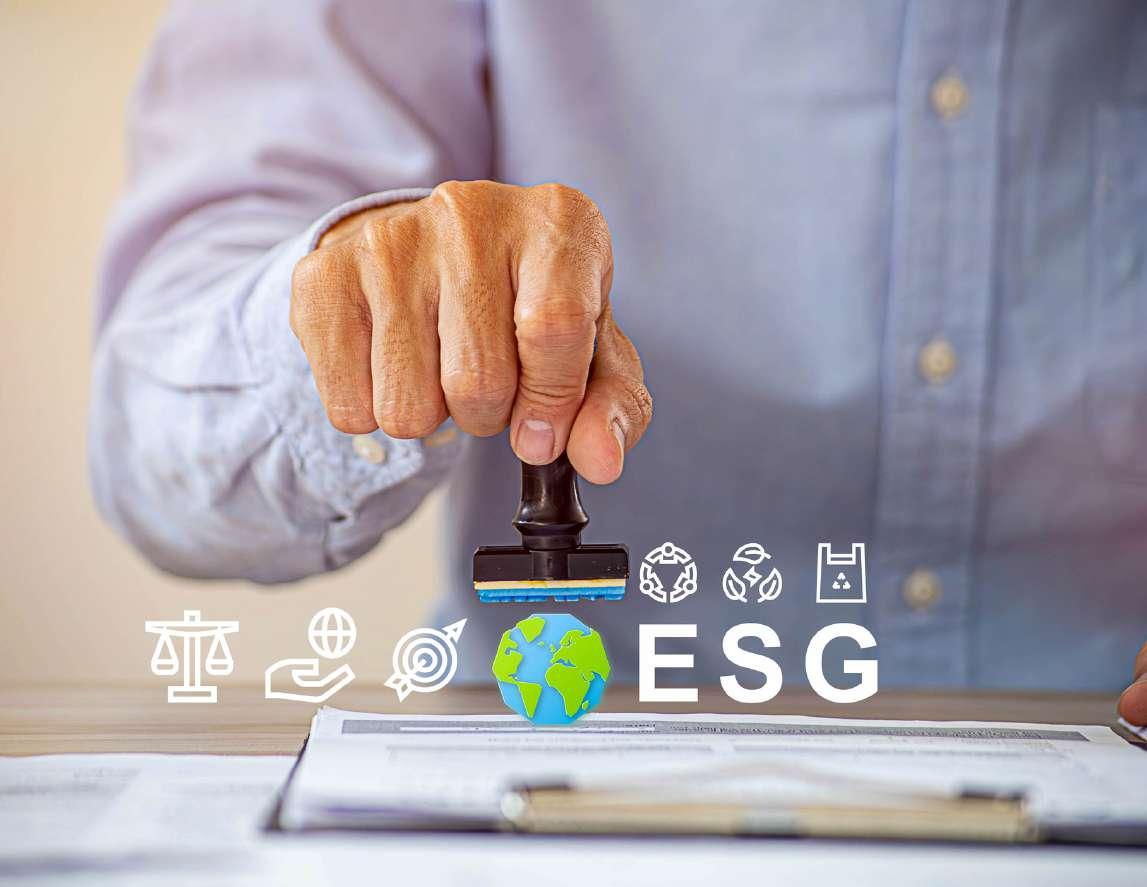
The prevailing notion is that “environmental, social, and governance” (ESG) awareness is not measurable. While some aspects of this conduct are embodied in law, much of it is internal. It’s also a state of mind, and it shapes the organisation’s persona. It reflects conduct to show that companies value the environment, are law-abiding, and are responsible for their employees.
This article will show, however, that ESG standards have evolved to be measurable and become an integral component of due diligence.
Environmental (E) refers to the corporation’s responsibility to reduce carbon emissions, conserve natural resources, and to adopt practices that reward the use of renewable energy and the reduction of waste.
The social (S) component is a commitment to promote diversity and inclusion in its employment policies. It means the company follows fair labor practices, supports local communities through social initiatives, and prioritises the health and safety of employees and customers.
Governance (G) is a mandate to maintain transparency, be ethical and to obey the law.
Positive ESG attitudes have commercial value because they are a signal to consumers and investors. Collectively, they show that an enterprise has a purpose beyond profitability and that the enterprise aligns its commercial pursuits with broader social and environmental good practices.
A due diligence assessment, conducted by investors within the ESG framework, evaluates the degree to which a company recognizes and fulfills its ESG responsibilities.
Decision No. 167/QD-TTg and Circular No. 13/2023/TT-BKHĐT aids private sector enterprises to follow positive business practices. The Sustainable Business Model Assessment Toolkit (SBMAT) creates a defined set of criteria, each assigned a specific weight. These criteria are utilised to assess the degree to which an enterprise implements these positive practices. Details are discussed on the Agency of Enterprise Development (AED) under the Ministry of Industry and Trade (MOIT) at: https://esg.business. gov.vn/evaluate.
Briefly, the SBMAT is divided into two primary sections: in Part 1 generic enterprise information is gathered; in Part 2, sustainability is measured and evaluated.
In Part 1, enterprises provide facts such as size, primary production, industry focus, and more.
In Part 2, enterprises provide details on how they interact with the environment, and what their internal Social, and Governance policies are. These practices are then scored.
Environment includes adherence to environmental standards; management of materials, energy, and water; biodiversity (using certified
sustainable materials, avoiding products sourced from endangered species); emissions, wastewater disposal or treatment; waste management; and other responsible practices.
Social includes employment practices and more: employee relations, occupational safety, education, diversity, equal opportunity, participation in unions, child labor, forced labor, civil rights, community engagement, social standards for suppliers, customer health and safety, and marketing practices.
Governance looks at ESG implementation, the structure, functions and performance of the board of directors, stakeholder engagement, transparency, shareholder rights, and a multitude of governance-related practices.
Once the business submits its inputs, the SBMAT gathers the data and generates a table with ESG scores.
ESG is a snappy term that signals that a corporation’s responsibility is not only to its own profitability and convenience but extends further into the community and society at large. Companies are expected to reduce emissions, engage with the community, ensure ethical governance, be desirable employers, optimize supply chain management, and accurately report ESG performance.
ESG actions are gradually mandated nationally and worldwide. For these reasons, investors have begun to take a target company’s ESG practices into account.
For example, starting in 2026, under the Carbon Border Adjustment Mechanism (CBAM), importers of goods into the EU

will have to monitor and report the carbon emissions associated with imports. During the CBAM transitional period, from 1 October 2023 until 31 December 2025, EU importers of specific goods such as cement, iron and steel, aluminum, fertilizers, electricity, and hydrogen must submit quarterly emission reports that relate to these imports. A significant portion of these products originate from Vietnam so Vietnam exporters will have to adjust their practices to remain competitive. Failure of EU importers to report can result in penalties ranging from EUR 10 to EUR 50 per ton of unreported emissions.
Decree No. 06/2022/NĐ-CP and Decision No. 01/2022/QĐ-TTg, effective from January 18, 2022, names 1,912 established entities whose activities involve natural resources and environment, construction, transportation and in the industrial and trade sectors. These entities must conduct periodic greenhouse gas inventories. The purpose of the inventory is to
determine Vietnam’s progress to reach greenhouse gas (GHG) net-zero emissions by 2050.
Under Vietnam’s recently amended Law of Environment Protection, manufacturers and importers of all products and goods must now exercise “extended producer responsibility” (EPR) towards the environment. There is now a level of responsibility throughout each stage of a product’s life cycle: design, production, consumption, and disposal. This means there is a need to take affirmative steps to minimise environmental harm. The steps include promoting resource-saving designs, reducing waste, recycling, and managing disposal. These regulations apply to manufacturers and importers’ responsibilities.
Specifically, under Decree 08/2022/NĐ-TTg (Decree 08), beginning January 1, 2024, manufacturers and importers of packaging, battery products, lubricants, tires, and tubes must now recycle a certain ratio of
the products. For example, manufacturers of rigid PET packaging must recycle 22% of their packages and use the recycled products as raw materials for others in PE fibers manufacturing. This requirement will extend to electrical and electronic products from January 1, 2025, and on January 1, 2027, vehicles will be added.
Also, under Decree 08, manufacturers and importers must either themselves recycle, including registering recycling plans and reporting recycling results to a designated agency, or they will have to pay a certain sum to the Vietnam Environmental Protection Fund and allow it to manage the recycling processes for them. Failure to comply or to meet standards will result in penalties and remedial measures.
As described in Article 4 of Decree No. 45/2022/NĐ-CP, an organisation or individual that commits an administrative environmental protection offence is liable to several penalties up to VND 2,000,000,000, suspension of environmental license, suspension of operations, and more.
Internationally, companies face increased pressure from shareholders to link executive compensation to ESG outcomes. In particular, there is a trend to include ESG metrics in executives’ long-term incentive plans.
In April 2016, Formosa Ha Tinh Steel Corporation, a subsidiary of Formosa Plastics Group, caused a significant environmental catastrophe in Vietnam. The company discharged toxic chemicals from its steel plant in Ha Tinh province into the ocean, resulting in severe harm to local fisheries,
coastal communities, and marine ecosystems. Formosa’s conduct impacted thousands of livelihoods and ignited nationwide outrage. The government imposed a US$500 million fine on the corporation and required extensive cleanup and compensation efforts.
At that time ESG standards, as they are known today, were weak or nonexistent. Today, ESG standards are much clearer, and failing to take them into account can expose companies to legal liabilities, fines, lawsuits, a mandate to cure, and regulatory sanctions.
Formosa’s conduct was seen to be criminal, deliberate and provocative. In today’s increasing public awareness, even a less serious infraction can expose the government to sanctions.
Without public understanding and expectation of ESG scores, negative consequences would have less impact. ESG scores measure a company’s performance and good citizenship in a way that the public easily understands. Weak scores will affect companies negatively. Maintaining public awareness of the meaning and significance of ESG scores will ensure that companies are held accountable for their environmental, social, and governance practices.
Stated differently, disregarding ESG standards can result in a negative reputation and a loss of trust from customers, employees, stakeholders, investors, and the wider community. The hope is that companies will be motivated to be ESG-compliant.
Mercedes-Benz and several other major car manufacturers are facing a class-action lawsuit in the U.S. over diesel emissions “cheating”. The companies are alleged to have installed a “diesel gate” software in their cars to bypass emissions tests.
In 2015, Volkswagen faced a similar lawsuit. The German car manufacturer was said to have programmed emission controls on their diesel vehicles which caused the vehicles’ NOx output to falsely meet US standards during regulatory testing. However, those vehicles were found to have emitted up to 40 times more NOx in real driving. The scandal has cost Volkswagen $33.3 billion in fines, penalties, financial settlements, and buyback costs.
i. Identifying potential ESG risks and opportunities before a decision is made
Investors can and should first study public information, such as the target company’s sustainability reports, related legal matters, and media coverage to assess its ESG track record and reputation.
ESG due diligence can uncover opportunities to create value through innovation, and market differentiation
In 2024, for example, Coca-Cola Vietnam set up 39 systems for students and school communities to access clean water. In a parallel initiative, Coca-Cola increased its use of refillable bottles and collected packaging for recycling through a program called World Without Waste. Such programs were met with public approval.
In summary, the aftermath of an ESG-ignorant or careless attitude can be financially catastrophic. Beyond immediate legal and regulatory penalties, companies suffer long-term damage to their brand reputation and market value.
These cautionary examples emphasise the change in public attitudes. ESG awareness and compliance by companies and due diligence investigation by investors are no longer an afterthought. By integrating a company’s ESG compliance into investment decisions, investors both manage and enhance the potential for sustainable and profitable outcomes.
ESG due diligence is an evaluation of a target company’s ESG opportunities, performance, and risks. The process involves several stages: (i) identifying potential ESG risks and opportunities, (ii) evaluating and prioritising the ESG issues that matter most, and (iii) integrating the information to facilitate the investment decision.
Hong Kong International Airport addresses social issues through various initiatives. In a creative move, Hong Kong International Aviation Academy offers people from all walks of life an opportunity to work in the aviation sector and provides training programs to upskill not only its staff but all who volunteer, thereby building a deep talent pool for the industry.
Investors can gather ESG performance data on the target company by collaborating with its internal and external stakeholders, members of the management board, employees, suppliers, and industry experts. They can easily find ways to sample internal opinions.
ESG due diligence can uncover opportunities to create value through innovation, and market differentiation. Investing in companies that, for example, cut waste, and use resources efficiently can boost profits. Investing in companies with fair labor practices can help investors avoid labor unrest and attract and retain more talent. Investing in companies with ethical supply chains can foster robust supplier relationships, project transparency,
and clear track records, enabling stakeholders to ensure adherence to standards.
ii. Evaluating and prioritising the ESG issues that matter most
Investors need to identify those ESG issues relevant to the target’s industry. For example, for a steel mill, employee satisfaction may be important but clean waste disposal may be critical. Making such a judgment helps investors to determine which ESG factors have the largest impact on the company’s financial performance, reputation, and its stakeholder relations. They can then assess whether the allocation of resources and effort addresses the critical areas.
In another example, if investors target a company that operates in the technology sector, and that provides online services and collects users’ data for advertising and analytics, then data privacy and security are critical ESG issues. Failure to protect user data could result in costly data breaches, regulatory fines and lawsuits, impacting the company’s reputation, profits and shareholder value. Due diligence examination must include an assessment whether there are robust data privacy and security measures in place.
iii. Integrating information to facilitate the investment decision
Findings from an ESG due diligence review are important markers. They can alert one to vulnerabilities that can affect future financial performance and reputation, or they can give comfort.
ESG continues to evolve. ESG is no longer a peripheral consideration; it has become a central priority. Increasingly, companies are obliged to take initiatives to balance ESG
goals, short-term financial requirements and long-term benefits. Negative ESG factors can tarnish the company’s reputation, leading to potential media-driven boycotts and profit loss. The public, employers, customers, and governments now take it seriously.
There is a cautionary note against “greenwashing”. While ESG might receive favorable media attention, there’s concern that it could be used as a tool for look-good press coverage. It’s too early to tell whether ESG will bring about genuine change or just a greenwashing tactic. To avoid this outcome, the public, media, and the companies themselves must take ESG seriously to ensure it leads to authentic improvements.
In summary, the ESG principle is not just a checkbox in a business transaction. It stands as a critical factor to shape the future success or failure of a business. Investors must integrate ESG elements into the decision-making process.


Lam Nguyen Hoang Thao, Foreign Associate, Russin & Vecchi
Prior to pursuing a law degree, and for nearly 12 years, Thao worked in the Energy Sector with Schlumberger, one of the world’s largest upstream oil and gas service companies, as a petroleum engineer.
Thao completed her Bachelor’s Degree in Law and Practical Legal Training in Australia.
Thao has both Vietnamese and Australian citizenship. She returned to Vietnam in 2022. She joined RUSSIN & VECCHI in 2023 and specializes in Energy Matters.
Email: LNHThao@russinvec chi.com.vn
IHC talks to Tianfu Liu, Vice President and Chief Counsel, Asia Pacific for Cabot Corporation, about his journey from private practice to global legal strategist

COULD YOU SHARE A LITTLE ABOUT YOUR JOURNEY IN YOUR CAREER SO FAR AND HOW YOU ENDED UP IN YOUR CURRENT ROLE? WE’RE ESPECIALLY CURIOUS ABOUT YOUR ADDITIONAL ROLE IN BUSINESS DEVELOPMENT!
I studied law at CUPL in Beijing, McGill in Montreal and Penn in Philly. Prior to Cabot, I was a private practitioner between 2003 and 2010, first and briefly with MoFo in its then newly established Shanghai office and later with Freshfields Bruckhaus Deringer. At Freshfields, my practice covered cross border mergers and acquisitions, securities and FDI, with a focus on advising multinational investors in the financial services and real estate sectors on their establishment or expansion in China. In 2010, I joined Cabot as its China GC. My role was subsequently expanded in 2015 to cover Asia Pacific, and in 2019 to provide legal oversight to Cabot’s global Reinforcement Materials Segment, its largest business division operating in Argentina, Brazil, Canada, China, Colombia, the Czech Republic, France, Indonesia, Italy, Japan, Mexico, the Netherlands and the U.S.

Since the beginning of 2022, I took on the role of Vice President, Strategic Business Development, AP Region in addition to my legal responsibilities for the AP region. In my newest capacity, I execute the company’s strategic projects in the AP region and manage their full lifecycle from market research, prospects identification, target screening and initial engagement, to modelling and valuation, due diligence, signing and closing, and eventually integration.
COULD YOU PROVIDE OUR READERS WITH AN OVERVIEW OF YOUR TEAM’S SIZE AND STRUCTURE.
In Asia Pacific, we have substantial business operations in Greater China, Japan, Korea, Singapore, India, Indonesia and Malaysia. We also have operations in the Middle East which is managed as part of the EMEA Region. Our AP legal team consists of three lawyers and one paralegal, stationed in China and India, respectively. In Indonesia where we have a sub-regional headquarters
and a sizable manufacturing operation, we use a secondment lawyer from our local counsel to support us on local law issues. I also manage two team members in my strategic business development role.
AT THE RECENT SHANGHAI INHOUSE COMMUNITY CONGRESS, YOU DELIVERED INSIGHTS ON STRATEGIC INTEGRATION AND COLLABORATION FOR IN-HOUSE LEGAL TEAM WITH OTHER DEPARTMENTS. FROM YOUR PERSPECTIVE, WHAT KEY STRATEGIES AND BEST PRACTICES WOULD YOU RECOMMEND FOR A GENERAL COUNSEL AIMING TO EXCEL IN THIS AREA?
First and foremost, stay close to the business (and other internal clients) to understand their priorities and provide advice that is practical and relevant to their needs. This can be achieved through regular participation in business updates or management meetings, corridor conversations with business
and functional leaders, etc. Second, strike a balance between being useful/flexible and being principled. A significant imbalance does not get you very far. Third, find your allies. Functions like finance, tax, HR, SH&ES (safety, health, environment and sustainability), product stewardship, etc. are natural candidates for alliance. Teaming up with allies on legal or compliance initiatives that are burdensome on the business (such as the enforcement of contract review procedures) will always make things easier and more effective.
CAN YOU RECALL A SITUATION DURING YOUR TIME AS GENERAL COUNSEL WHERE YOU MADE THE DECISION TO OPPOSE A COMPANY ACTION, DESPITE ANTICIPATING POTENTIAL CONTENTION?
After we acquired a local company in China, we found that the target company, prior to acquisition, failed to disclose to its number one customer the change of its production
site, which would have required the customer’s re-qualification and approval. Whether or not we should tell the customer about this and risk the loss of a sizable business became a tough question for the business team who were keen to deliver business results. The GM wanted to work on the issue in a “low profile” manner. We escalated the issue to the highest level of the company’s management and decided to voluntarily disclose. The customer accepted our disclosure and re-qualified the new site in a timely fashion, with little impact on our business.
WHEN SELECTING A LAW FIRM FOR OUTSOURCING WORK, WHAT SPECIFIC QUALITIES DO YOU PRIORITISE? COULD YOU ELABORATE ON YOUR DECISION-MAKING PROCESS WHEN ENGAGING WITH EXTERNAL LEGAL PARTNERS?
Quality of work, cost, responsiveness and understanding of our business are among the


most important qualities I constantly look for in external counsels. Start always with smaller, less critical projects to observe and compare; spend quality time with counsels to help them understand the context of a particular task and the key components of the deliverable.
IN TODAY’S FAST-PACED LEGAL ENVIRONMENT, MAINTAINING A HEALTHY WORK-LIFE BALANCE IS PARAMOUNT. HOW DO YOU PERSONALLY PRIORITISE WELLBEING AMIDST THE DEMANDS OF YOUR ROLE AS GENERAL COUNSEL, AND WHAT STRATEGIES DO YOU ADVOCATE FOR PROMOTING A HEALTHY WORK-LIFE BALANCE WITHIN YOUR LEGAL TEAM?
Foster a culture of healthy lifestyle through daily conversations, group chats, and team activities. We established a fitness club during the Pandemic. Each member is
required to publish his/her daily exercise in a group chat. People who failed to do any exercise for more than 2 days in a given week are obliged to give out a “red pack” in the group chat. I lost about 40 pounds in the last 4 years, thanks to regular weight training and healthy diet, and that had been a huge motivating factor for people around me.
OUTSIDE OF YOUR PROFESSIONAL ENDEAVOURS, WHAT ARE SOME PERSONAL PASSIONS OR HOBBIES THAT YOU ENJOY PURSUING?
I have been playing golf almost every week for over 10 years. My family enjoys skiing in the winter. Sometimes, I do a bit of cooking at home for my family, or practice Chinese calligraphy. As I think about them, all these hobbies have the power to distract me from the day-to-day routines and keep me focused on something I enjoy doing, alone or with others.
Your ‘at a glance’ guide to some of the region’s top service providers.
Practice Area key
Alt’ Investment Funds (inc. PE)
Antitrust / Competition
Broad & Bright
Tel: (86) 10 8513 1818
Email: broadbright@broadbright.com
Contact: Mr Jun Ji (Jun_ji@broadbright.com)
Website: www.broadbright.com
COM • CMA • ENR • LDR • TMT
East & Concord Partners
Tel: (86) 10 6590 6639
Email: Beijing@east-concord.com
Contact: Mr. Dajin Li Website: www.east-concord.com
BF • CM • CMA • IP • LDR
Llinks Law Offices
Tel: (86) 21 31358666
Email: master@llinkslaw.com
Website: www.llinkslaw.com
BF • CM • CMA • INV • LDR
W. K. To & Co.
Tel: (86) 10 8587 5076
Email: wktoco@wktoco.com
Contact: Cindy Chen
Website: www.wktoco.com
CMA • E • LDR • RE • REG
Conyers Dill & Pearman
Tel: (852) 2524 7106
Email: hongkong@conyers.com
Contact: Christopher W.H. Bickley, Partner, Head of Hong Kong Office
Website: www.conyers.com
BF • CM • CMA • INV • LDR
Elvinger Hoss Prussen
Tel: (852) 2287 1900
Email: xavierlesourne_hk@elvingerhoss.lu
Contacts: Mr Xavier Le Sourne, Partner, Ms Charlotte Chen, Counsel Website: www.elvingerhoss.lu
* Elvinger Hoss Prussen’s Hong Kong office provides inbound and outbound legal services only under Luxembourg law
BF • CM • CMA • INV • TX
W. K. To & Co.
Tel: (852) 3628 0000
Email: mail@wktoco.com
Contact: Vincent To Website: www.wktoco.com
CMA • E • LDR • RE • REG
Anand and Anand
Tel: (91) 120 4059300
Email: pravin@anandandanand.com
Contact: Pravin Anand - Managing Partner Website: www.anandandanand.com
IP • LDR
Litigation & Dispute Resolution
Maritime & Shipping
Projects & Project Finance (inc. Infrastructure)
Real Estate / Construction
Restructuring & Insolvency
Taxation
Telecoms, Media & Technology
Clasis Law
Tel: (91) 11 4213 0000, (91) 22 4910 0000
Email: info@clasislaw.com
Contacts: Vineet Aneja, Mustafa Motiwala Website: www.clasislaw.com
CMA • E • LDR • REG • RES
ABNR (Ali Budiardjo, Nugroho, Reksodiputro)
Tel: (62) 21 250 5125/5136
Email: info@abnrlaw.com infosg@abnrlaw.com
Contacts: Emir Nurmansyah, enurmansyah@abnrlaw.com) Nafis Adwani, nadwani@abnrlaw.com Agus Ahadi Deradjat, aderadjat@abnrlaw.com Website: www.abnrlaw.com
BF • CM • CMA • ENR • PF
Makarim & Taira S.
Tel: (62) 21 5080 8300, 252 1272
Email: info@makarim.com
Contact: Lia Alizia
Website: www.makarim.com
BF • CMA • E • LDR
Mochtar Karuwin Komar
Tel: (62) 21 5711130
Email: mail@mkklaw.net, ek@mkklaw.net
Contact: Emir Kusumaatmadja
Website: www.mkklaw.net
CMA • ENR • LDR • PF
SSEK Legal Consultants
Tel: (62) 21 521 2038, 2953 2000
Email: ssek@ssek.com
Contact: Denny RahmansyahManaging Partner Website: www.ssek.com
Twitter: @ssek_lawfirm
BF • CMA • E • ENR • RE
Adnan Sundra & Low
Tel: (603) 2070 0466
Email: enquiry@adnansundralow.com
Contacts: Deepak Sadasivan, Rodney D’Cruz Website: www.asl.com.my
BF • CM • CMA • IF • PF
Azmi & Associates
Tel: (603) 2118 5000
Email: general@azmilaw.com
Contact: Dato’ Azmi Mohd AliSenior Partner Website: www.azmilaw.com
BF • CM • CMA • ENR • PF
Trowers & Hamlins LLP
Tel: (601) 2615 0186
Email: nwhite@trowers.com
Contact: Nick White – Partner Website: www.trowers.com
BF • CMA • ENR • IF • PF
ACCRALAW (Angara Abello
Concepcion Regala and Cruz Law Offices)
Tel: (632) 830 8000
Email: accra@accralaw.com
Contacts: Emerico O. De Guzman, Ana Lourdes Teresa A. Oracion, Neptali B. Salvanera Website: www.accralaw.com
CMA • E • IP • LDR • TX
DivinaLaw
Tel: (632) 822-0808
Email: info@divinalaw.com
Contact: Nilo T. Divina, Managing Partner Website: www.divinalaw.com
BF • CMA • E • LDR • TMT
Morales & Justiniano
Tel: (632) 834 2551, (632) 832 7198, (632) 833 8534
Email: ramorales@primuslex.com
Contact: Mr. Rafael MoralesManaging Partner Website: www.primuslex.com
BF • CM • CMA • IP • LDR
Ocampo & Suralvo Law Offices
Tel: (632) 625 0765, Email: info@ocamposuralvo.com
Contact: Jude Ocampo Website: www.ocamposuralvo.com
CMA • ENR • PF • TX • TMT
SyCip Salazar
Hernandez & Gatmaitan
Tel: (632) 8982 3500, 3600, 3700
Email: sshg@syciplaw.com
Contact: Hector M. de Leon, Jr. - Managing Partner Website: www.syciplaw.com
BF • CMA • E • ENR • PF
Villaraza & Angangco
Tel: (632) 9886088
Email: fm.acosta@thefirmva.com
Contact: Franchette M. Acosta Website: www.thefirmva.com
CMA • IP • LDR • REG • RES
Bae, Kim & Lee LLC
Tel: (82 2) 3404 0000
Email: bkl@bkl.co.kr
Contact: Kyong Sun Jung Website: www.bkl.co.kr
BF • CMA • IA • LDR • RE
Kim & Chang
Tel: (82-2) 3703-1114
Email: lawkim@kimchang.com Website: www.kimchang.com
COM • BF • CMA • IP • LDR
Yoon & Yang LLC
Tel: (82 2) 6003 7000
Email: yoonyang@yoonyang.com
Contacts: Jinsu Jeong, Junsang Lee, Myung Soo Lee Website: www.yoonyang.com
COM • E • IP • LDR • TX
Yulchon LLC
Tel: (82-2) 528 5200
Website: www.yulchon.com
COM • CMA • IP • LDR • TX
Deep & Far Attorneys-at-Law
Tel: (8862) 25856688
Email: email@deepnfar.com.tw
Contact: Mr. C. F. Tsai
Website: www.deepnfar.com.tw
COM • CM • E • IP • LDR
Chandler MHM Limited
Tel: (66) 2266 6485
Email: jessada.s@chandlermhm.com, satoshi.kawai@chandlermhm.com
Contacts: Jessada Sawatdipong, Satoshi Kawai
Website: www.chandlermhm.com
BF • CMA • ENR • PF • RE
Kudun & Partners Limited
Tel: (66) 2 838 1750
Email: info@kap.co.th kudun.s@kap.co.th chinawat.a@kap.co.th pariyapol.k@kap.co.th
Contacts: Kudun SukhumanandaCapital Markets, Corporate M&A, Banking & Finance Chinawat AssavapokeeTax, Corporate Restructuring, Insolvency Pariyapol KamolsilpLitigation / Dispute Resolution
Website: www.kap.co.th
CMA • CM • LDR • RES • TX
Pisut and Partners Co., Ltd.
Tel: (66) 202 66226, 202 66227
Email: info@pisutandpartners.com
Contacts: Mr. Pisut Rakwong Website: www.pisutandpartners.com
CM • CMA • E • LDR • RE
Weerawong, Chinnavat & Partners Ltd.
Tel: (66) 2 264 8000
Email: Veeranuch.t@weerawongcp.com
Contacts: Veeranuch ThammavaranucuptSenior Partner
Website: www.weerawongcp.com
BF • CM • CMA • LDR • PF
Global Vietnam Lawyers LLC
Tel: (84) 28 3622 3555
Email: info@gvlawyers.com.vn
Contacts: Nguyen Gia Huy Chuong Website: www.gvlawyers.com.vn
CMA • IP • LDR • RE • REG
LE & TRAN
Tel: (84) (28) 38 421242
Contact: Stephen Le Email: info@letranlaw.com Website: www.letranlaw.com
COM | E | IA | LDR | RE | RES
Russin & Vecchi
Ho Chi Minh Office:
Tel: (84) 28 3824-3026
Email: lawyers@russinvecchi.com.vn
Contacts: Sesto E Vecchi - Managing Partner Nguyen Huu Minh Nhut – Partner Nguyen Huu Hoai – Partner
Hanoi Office:
Tel: (84) 24 3825-1700
Email: lawyers@russinvecchi.com.vn
Contact: Mai Minh Hang – Partner Website: www.russinvecchi.com.vn
CMA • E • IP • INS • TMT
VILAF
Tel: (84) 28 3827 7300, (84) 24 3934 8530
Email: duyen@vilaf.com.vn, tung@vilaf. com.vn, anh@vilaf.com.vn
Contacts: Vo Ha Duyen, Ngo Thanh Tung, Dang Duong Anh Website: www.vilaf.com.vn
BF • CMA • RE • ENR • LDR
Trowers & Hamlins
Tel: (973) 1 751 5600
Email: bahrain@trowers.com
Contact: Louise Edwards - Office Manager Website: www.trowers.com
BF • CMA • IF • LDR • RE
Trowers & Hamlins
Tel: (968) 2 468 2900
Email: oman@trowers.com
Contact: Louise Edwards - Office Manager Website: www.trowers.com
BF • CMA • LDR • PF • RE
Afridi & Angell
Email: dubai@afridi-angell.com
Contact: Bashir Ahmed - Managing Partner Website: www.afridi-angell.com
BF • CMA • LDR • RE • REG
AMERELLER
Tel: (971) 4 432.3671
Email: gunson@amereller.com
Contact: Christopher Gunson Website: www.amereller.com
CMA • E • IA • LDR • REG
Trowers & Hamlins LLP
Dubai office:
Tel: (971) 4 351 9201
Email: dubai@trowers.com
Contact: Jehan Selim - Office Manager
Abu Dhabi office:
Tel: (971) 2 410 7600
Email: abudhabi@trowers.com
Contact: Jehan Selim - Office Manager Website: www.trowers.com
BF • CMA • LDR • PF • RES
Meyer Unkovic Scott
Tel: (412) 456 2833
Email: du@muslaw.com
Contact: Dennis Unkovic Website: www.muslaw.com
CMA • IP • IA • LDR • RE
Beijing Arbitration Commission / Beijing International Arbitration Center (Concurrently use)
Tel: (86) 10 85659558
Email: xujie@bjac.org.cn
Contact: Mr. Terence Xu(許捷) Website: www.bjac.org.cn
Hong Kong International Arbitration Centre
Tel: (852) 2525 2381
Email: adr@hkiac.org Website: www.hkiac.org
Maxwell Chambers Pte Ltd
Tel: (65) 6595 9010
Email: info@maxwell-chambers.com
Website: maxwell-chambers.com
Shenzhen Court of International Arbitration (Shenzhen Arbitration commission)
Tel: (86) 755 83501700, (86) 755 25831662
Email: info@scia.com.cn
Website: www.scia.com.cn
LOD - Lawyers On Demand
Tel: (65) 6326 0200
Email: singapore@lodlaw.com
Contact: Oliver Mould
Website: lodlaw.com
Peerpoint by Allen & Overy
Tel: (852) 2974 7000
Email: info@peerpoint.com
Contact: Stephanie Szeto
Website: www.peerpoint.com
Vario from Pinsent Masons (HK) Ltd
Tel: (852) 2294 3454
Email: enquiries@pinsentmasonsvario.com
Website: https://pinsentmasonsvario.com
LegalComet Pte Ltd (LEGALCOMET)
Tel: (65) 8118 1175
Contact: Michael Lew, Founder & CEO
Email: michael@legalcomet.com
Website: www.legalcomet.com
Konexo
Tel: (65) 66911 4567
Contacts: Joan Oh
Email: enquiries@konexoglobal.sg Website: www.konexoglobal.com
True Recruitment Asia
Tel: (852) 5325 9168
WhatsApp: (852) 5325 9168
Email: kannan@truerecruitmentasia.com
Splash Diving (HK) Limited
Learn to Dive and Fun Dive with the Winner of the PADI Outstanding Dive Centre/Resort Business Award!
Tel: (852) 9047 9603, (852) 2792 4495
Email: info@splashhk.com
Website: www.splashhk.com
Impact India Foundation
An international initiative against avoidable disablement. Promoted by the UNDP, UNICEF and the World Health Organization in association with the Government of India.
Tel: (91) 22 6633 9605-7
Email: nkshirsagar@impactindia.org
Website: www.impactindia.org


